#and in the end of her long arc she decides to embrace her ''sins'' by turning against her horrible system entirely
Explore tagged Tumblr posts
Text
Realizing that my version of Hollyleaf is shaping up to be Homura Akemi adjacent. Sort of.
#shy and demure at first. just wants to help everyone but is deeply insecure and self loathing#and she puts all of her self worth then into upholding the warrior code. becomes a medic to ensure that.#becomes more confident in the role but becomes disillusioned after some devastating secret where she feels cheated#and in the end of her long arc she decides to embrace her ''sins'' by turning against her horrible system entirely#and that involves being with her gay love interest (which she views as sinful but doesnt care anymore)#and at the end of the day their arcs are related to religious trauma#so its not totally the same but like. theres some influence in my line of thought djglkdfjglfg#like she doesnt become obsessed with willowshine and being her protector when thats homuras whole thing in madoka#and homura doesnt like. attempt to kill her own mom and tbh she doesnt really own being a good little christian girl at all#oh also theyre both Emo as Hell#razorverse
7 notes
·
View notes
Text
Final Akane + AquaKane Thoughts
There are so many things to say that I don't even know how to start organizing my thoughts lol I'll also be including my final thoughts about the "love triangle" while I'm at it, so this is probably going to get long!
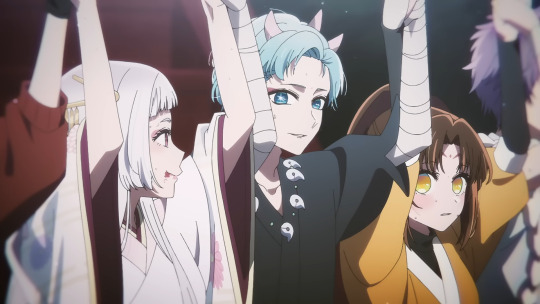
I've written quite a bit about Aqua/Akane this past year, so I won't be going into detail into any of the things I've already discussed up to now. Instead, I'll just focus on my thoughts on this final set of chapters, as well as my overall thoughts now that the manga is over.
I'll start with the (few) things I liked:
The Good
I mentioned before that I'm a sucker for parallels, and that Aqua/Akane having so many is one of the reasons why I couldn't help but ship them. We somehow got some very good ones in these last few chapters. We even got a scene at the Aqua/Akane bridge, the one where Akane's relationship with Aqua began and ended.
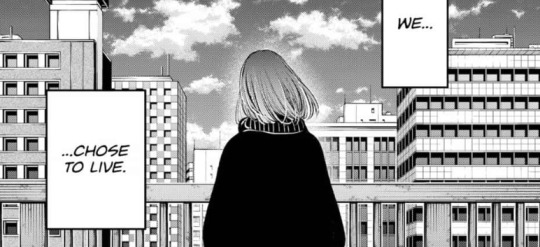
Aqua saved her life at that bridge, without any ulterior motives. And it's that very bridge that is pictured as Akane says that she has decided to live on. The imagery is poignant and pays its respects to not only Akane's arc as a character, but also to the Aqua/Akane relationship.
More than that, the parallels we got confirm things that Akane and Aqua/Akane fans like me have been saying all along:
Through it all, Akane saw him as he is and embraced the broken him. Each time, she willingly chose to get closer to him. When Aqua tells Akane that he has been saved ever since he met her, I get it. I have no doubt that for Aqua, who has been desperately fighting alone for so long, being seen and understood and loved despite all his self-perceived flaws and the darkness in him must have felt like salvation.
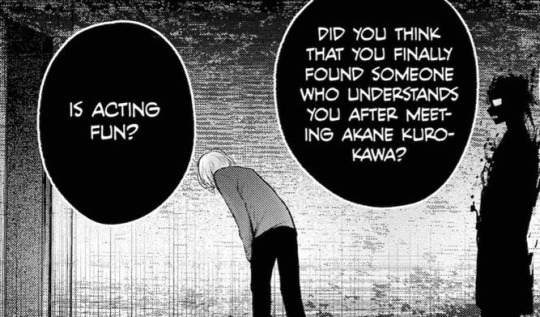
Akane is the one who knows Aqua the best, the one who knows him the most, the one who sees him exactly as he is and who loves all of him. Akane doesn't romanticize Aqua's flaws and his self-sacrificial nature, and neither does she idealize his virtues. She just accepts him and does her best to support and understand him through it all.
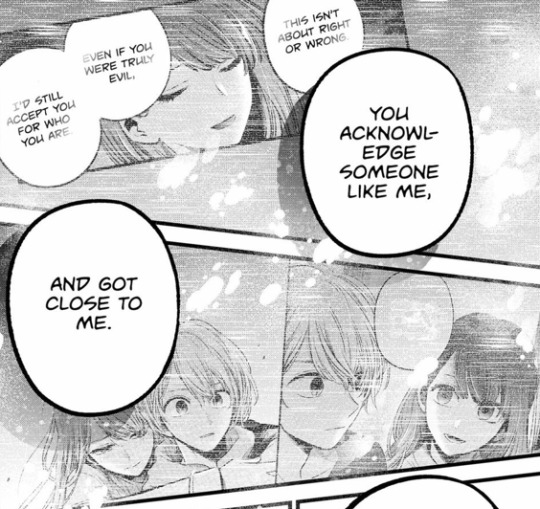
Akane being the only one who can see through Aqua's plan is enough to prove this, but it's actually not the most meaningful way in which Aka confirmed it. The most meaningful way was actually this:
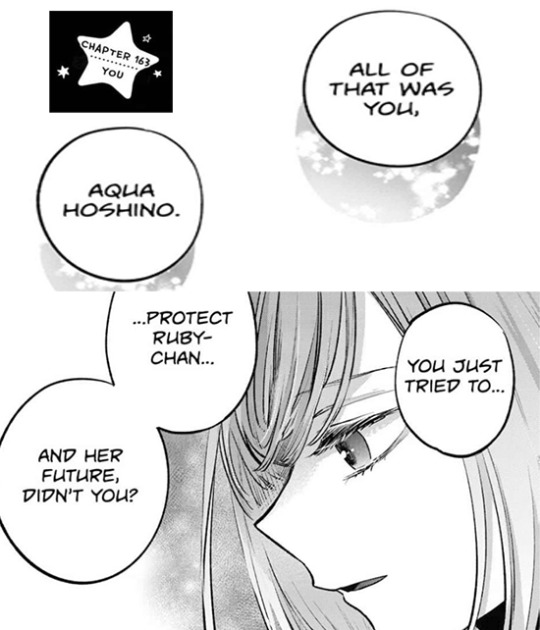
Usually, whenever Akane thinks about Aqua, she calls him Aqua-kun. However, throughout her entire monologue in the last three chapters, Akane never addresses him by name. She just calls him "You". The same "You" (君) that Aka emphasized in Chapter 63.
The "You" that encapsulates everything Aqua Hoshino was: both the Goro and the Aqua.
This was a very, very deliberate narrative choice that tells you that throughout the manga, Akane was the one who loved Aqua Hoshino exactly as he was.
Aka also uses another parallel to confirm that Akane was indeed lying to Kana when she claimed that she was over Aqua.
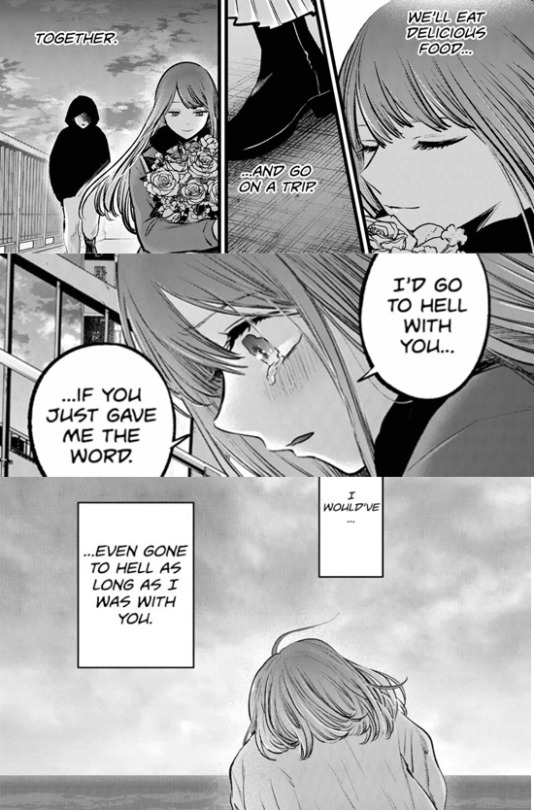
When she finally breaks down, Aka allows Akane to be honest about her feelings, and the parallel to the Aqua/Akane break-up tells us everything we need to know.
Akane never stopped loving Aqua. She has been in love with him all along.
Ever since they broke up, Akane has been sacrificing her feelings for Aqua in order to do what she thinks is best for him. Akane's priority has always been to see Aqua happy. She is willing to do whatever it takes to accomplish that. Back when she thought that Aqua needed to kill Kamiki, Akane was willing to shoulder that sin with him just so he wouldn't have to carry it on his own. When she realized that what Aqua truly wanted was to be free from his revenge, Akane was ready to deal with Kamiki on her own just so that Aqua wouldn't get his hands dirty. Then, when Aqua pushes Akane away, Akane becomes determined to stop him from killing Kamiki because she knows revenge is not what Aqua truly wants or needs.
But that's not all there is to it. Akane wants to be with Aqua, because she loves him. And it's precisely because she loves him, and because she thinks her love failed to save him, that she keeps her feelings to herself and is even willing to help another girl get close to him in her place.
So this chapter confirmed that the one who has been making the sacrificial play, the one who truly loved Aqua, was Akane. It is, essentially, the counterpart to Chapters 148 and 149.
It's no wonder, then, that Akane's feelings and her grief are the ones we follow immediately after Aqua's death. She goes to mourn him in the place he actually died, and when she's around his family, she keeps her pain to herself in order to not worsen their burden. We see her piece together what happened, we see her break, and then we see Akane put herself together and find some solace in knowing that Aqua kept her away to protect her.
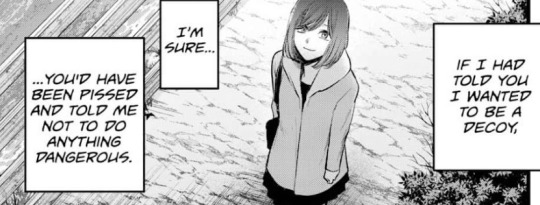
Aqua is gone, and Akane is the only one to know Aqua's truth.
A lot of people spent the entire manga trying to downplay Aqua's relationship with Akane; claiming that it was a lie, a manipulation, or what-have-you. Now that the manga is over, we can say those claims were never proven.
At the contrary, until the very end, Aqua's thoughts & actions in regard to Akane were shown to back-up everything he said about her during their relationship.
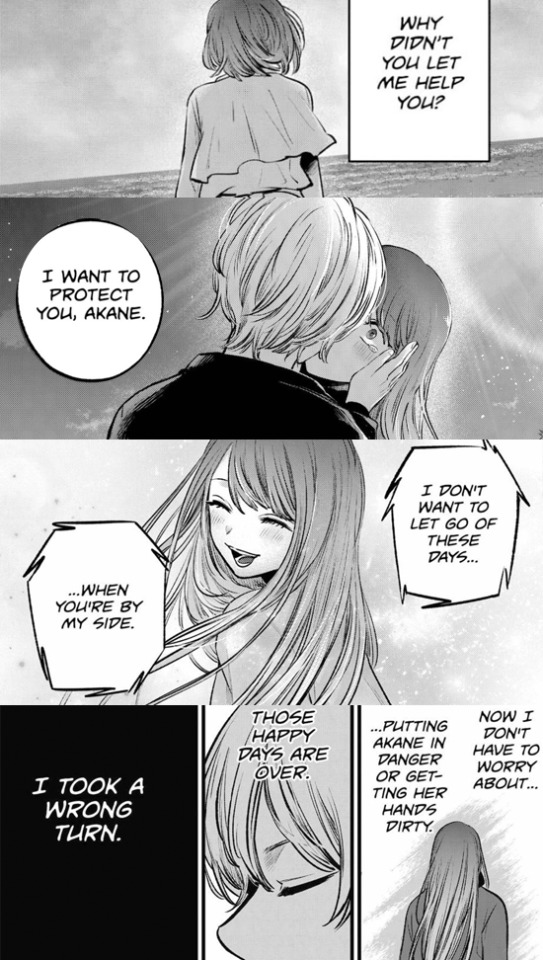
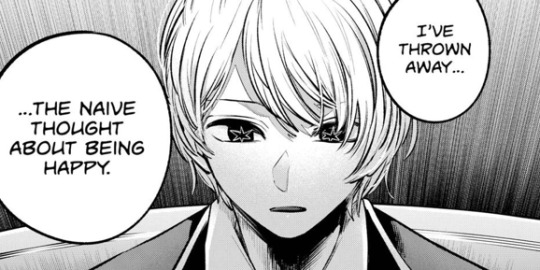
Aqua could've lived if he had asked Akane for help in killing Kamiki, but he didn't want Akane to get her hands dirty for him. He broke up with her to not bring her down to hell with him, and when the options were to either die alone or make Akane bear the weight of a sin with him, the choice was quickly made.
At the end, he's even shown wanting the same thing Akane wanted: an equal relationship with her.
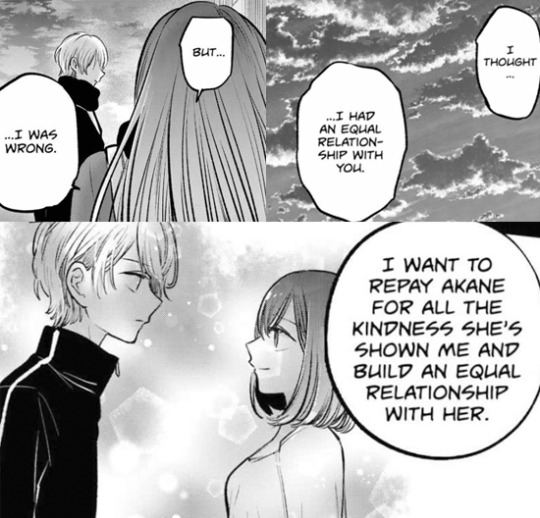
Unlike his thoughts about Kana (more on that later), which are just a 'might', this is something Aqua is purposeful about. It's something he is sure he wants. It's even the last thing he thinks of before wanting to see Ruby at the dome, which we all know was his dearest wish.
This also fits the panels chosen to be shown in the "romance" part of Aqua's montage: the moment he doesn't catch Kana's ball (symbolizing that their feelings don't connect) vs the moment where he chooses to kiss and date Akane for real.
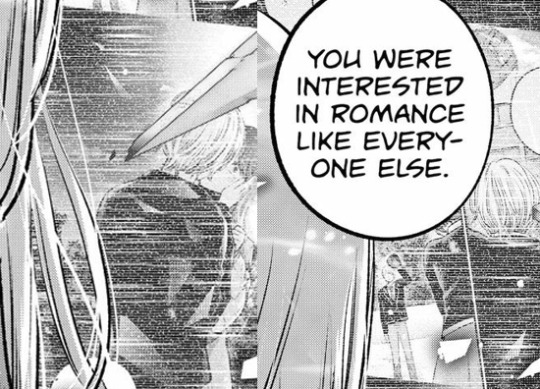
Which brings us back to the moment they broke up. That chapter was titled "Going Astray" and we now saw where that wrong turn led Aqua: to his death.
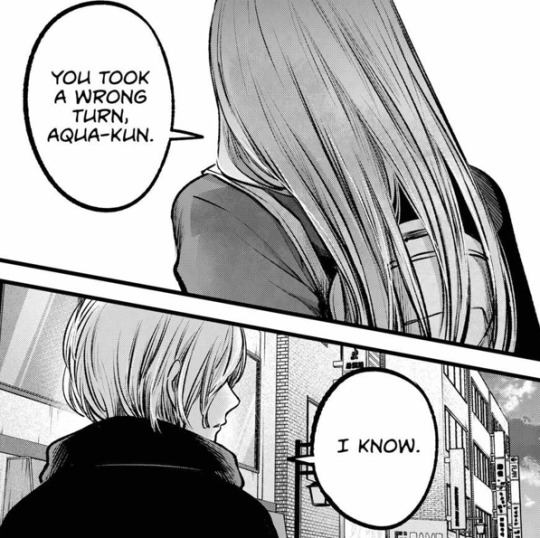
So chapter 98, the Aqua/Akane break-up, is pretty much officially the chapter that leads us to the ending we got.
Which means that what I said back in this post still applies. If Aqua and Akane had been honest with each other during that phone-call in Chapter 97, things could've been different. But truth is, it's nearly pointless to think about it, because what this all comes down to is that Aka wanted this ending and he wanted it at all costs.
So nothing could have happened any other way, because Aka didn't want Aqua to be saved. He wanted Aqua to die so he could have his forced "bittersweet" ending.
This is why Aqua and Akane had to break up, it's why Akane is practically not allowed to interact with Aqua again after their break-up, and it's also why Akane never found out about Aqua being Goro's reincarnation.
Aqua was never meant to be saved, and Akane more than anyone could have saved him. So, of course, Aka couldn't allow her to do so. It's forced writing at its finest.
This is also why Akane isn't involved in Aqua's fatidic confrontation with Kamiki. While there is Aka's typical contrived writing involved in Akane leaving Aqua to his own devices at the most crucial moment, I do think it makes sense.
I've mentioned before that from the very beginning, Aqua and Akane's relationship has been based on trust and on choices.
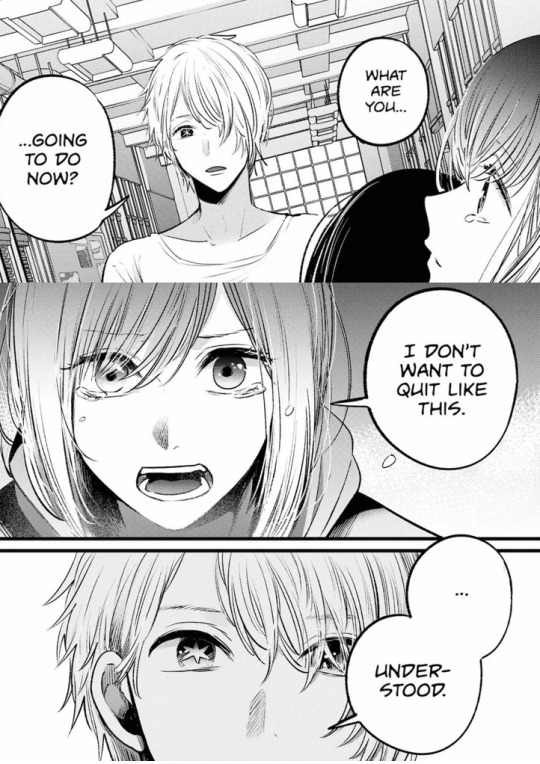
Aqua once gave Akane a choice, trusting that she'd be able to choose what was best for herself. After Akane made her choice, Aqua did everything in his power to help her accomplish her goal.
Ever since, Akane has been trying to do the same for Aqua.
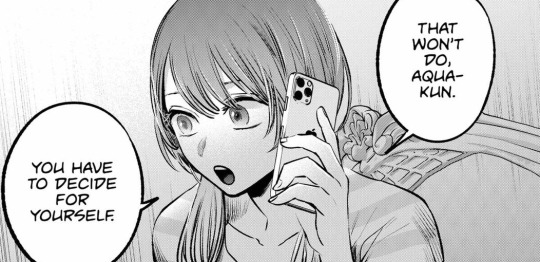
Akane wants Aqua to choose what's right for himself. She will always respect whatever it is that he chooses, as long as it is a true reflection of what he wants and needs. This is why Akane was eager to stop his plan to kill Kamiki, she could tell that Aqua was ready to sacrifice his own future to accomplish it.
That's why, once Aqua chooses to let Kamiki live, Akane is reassured.
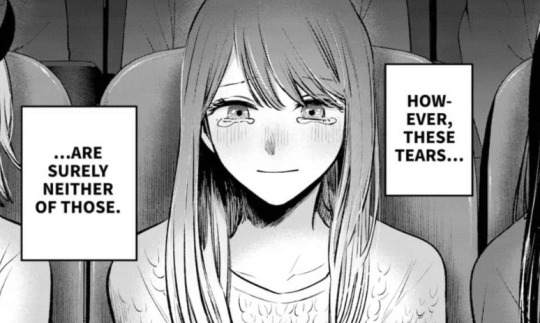
Something has changed in Aqua. Akane notices this and believes that Aqua has, finally, chosen to not throw his life away just to deal with Kamiki. She trusts that he has.
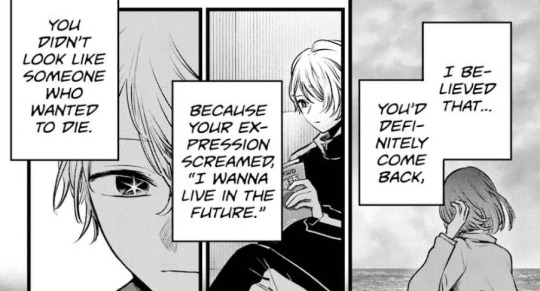
Personally, I'd like to believe that Akane was right. Problem was that once Aqua knew for sure that Kamiki couldn't be saved, he switched back to his original plan. Something Akane couldn't have foreseen without knowing that Aqua was the reincarnation of a dude whose issues made him suicidal... which is yet another reason why Aka could have never let Akane find out about the whole reincarnation business.
So all in all, Aqua/Akane-wise, this is all well and good. On paper.
When it comes to the execution however, it leaves a lot to be desired, because Aqua/Akane is sadly majorly brought down by the spectacular way in which Aqua's character was (mis)handled during the second half of the manga.
The Bad
Goro has always been someone who thinks his life has no worth, and this belief is deeply ingrained into Aqua. That's why I could tell that his revenge plan likely involved killing himself and making it look like Kamiki did it.
I just didn't think that he would actually succeed, because it kind of goes without saying that the suicidal character getting to kill himself is far from being a satisfying ending. Even less so when said character has shown time and time again that he actually wants to live, he is just too broken by his guilt complex to believe he has that right.
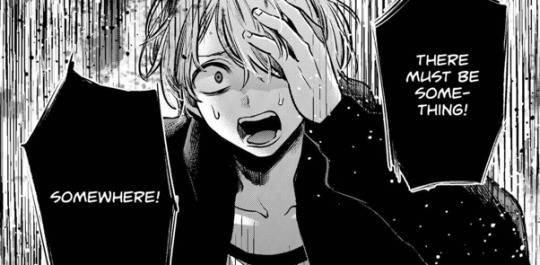
For a while there, it even looks like Aqua will make it. That he has once again started to embrace that this is a life that he wants to live.
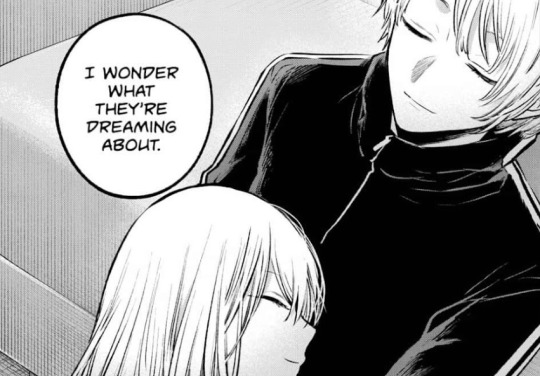
Sadly, once Aqua realizes that Kamiki can't be saved and that he poses a danger to Ruby, all of that flies off the window and "Goro" takes over. And by "Goro" I don't mean Goro the character, I mean all the bad habits that Aqua has due to his guilt-complex and survivor's guilt.
So Aqua goes and executes his original plan, killing himself instead of looking for a better solution. Which means he started off like this:
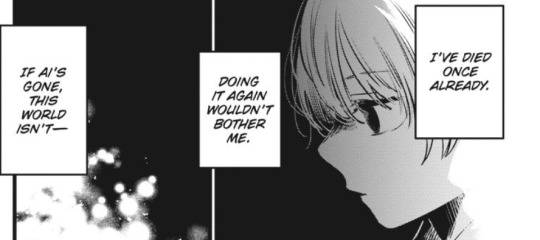
Only to end the manga pretty much the same way, except you can switch "If Ai's gone, this world isn't-" for "As long as Ruby can live on in this world."
Though, actually, it's even worse than that, because Aqua realizes that he was wrong — dying would bother him — only when it's too late.
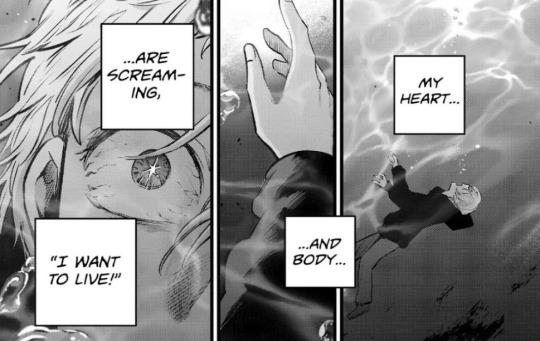
It leaves a bad taste in my mouth because it's like Aqua had no development through the entire manga. Cut everything after his break-up with Akane and nearly nothing changes, except the motive behind Aqua throwing his life away: protecting Ruby (Sarina) instead of revenge.
It all feels even more pointless because Aqua's death rings hollow due to how badly his character was mishandled in the second half of the manga. After the break-up, Aqua becomes a "..." bot. His character isn't allowed to grow and neither is he allowed to explore his feelings in any meaningful way, to the point that he dies confused and not knowing who he was.
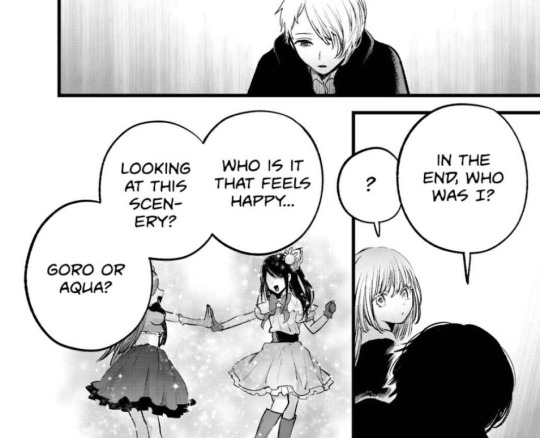
Pardon my bluntness, but how pathetic is this? 160+ chapters and literally none of this guy's issues were ever solved. His character goes nowhere, only so he can be sacrificed to make the ending bittersweet for Ruby. Though for me it wasn't even bittersweet; the ending fell flat on its face precisely because Aqua's character never goes anywhere, so it's hard to feel anything other than vague frustration and disbelief at how forced the writing is.
Even the Kami/Ai - Aqua/Akane parallels were wasted because both ships ended up in the exact same way: Akane and Ai both unable to save Aqua and Kamiki. I wouldn't even be surprised if those parallels are something Aka came up with on the spot while writing the Ai DVD.
I'm sure some Aqua/Akane truthers will say "all Aqua and Kamiki needed to be saved was to be with Akane and Ai, and Akane and Ai didn't realize that" and leaving aside my issues with that kind of co-dependency, once again, that's all well and good — on paper.
Sure, those of us who ship Aqua and Akane could see it that way if we wanted to, but... did Aka make a point of clearly stating this? No, he left it to the reader's imagination, which means it's just another blank to be filled with headcanon.
Personally, I'm pretty tired of doing that, because everything there is to like about the manga may as well just be the headcanons we have filled all those blanks with.
I always say that I prefer showing and not telling, but there's a limit to everything. Truth of the matter is, if this was supposed to be the case — and especially if it was supposed to be important — then showing isn't enough. Because the majority of readers aren't going to spend hours breaking down every single Aqua/Akane interaction to draw those parallels and reach that conclusion.
Aqua dying soothed by a song by his favorite idol (Ruby/Sarina) doesn't really do it any favors either, because fact of the matter is that people who were never invested in the Aqua/Akane relationship will just assume Aqua never loved Akane back. They'll be more distracted by Kana's tropey, shallow shoujo romance, and this is something Aka allowed in his manga right up to the very end.
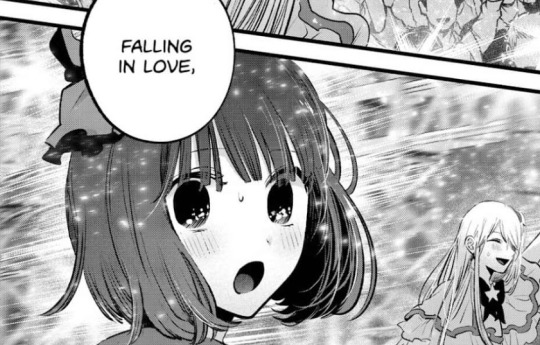
Aqua and Akane were the only relationship in the entire manga that got mutual, gradual, organic, continuous development. But this all came to a halt when they broke up, so at the end of the day, they're mostly left up to interpretation.
It's underwhelming.
Most of all, if you ask me, it was a terrible move, because Aqua and Akane could've been the heart of this manga. If their feelings had been properly explored after their break up, if Aqua had been allowed to think of Akane in his last moments, if all this blank-filling had been actual text, they'd have been a tragic love-story for the ages.
But Aka didn't want it to be the heart of the manga, because he had already decided from the beginning that role should go to Aqua and Ruby. Alas, he completely failed at developing that, too, because to the very end there's only Goro and Sarina. That is the entire basis of the Aqua/Ruby relationship and dynamic, and it gets one single chapter where it's explored beyond that, only to immediately focus back on Goro and Sarina as Aqua lies dying.
Goro couldn't save Sarina in his first life, so he wastes his second to do it. He jumped at the chance to free himself of the burden of that guilt without even bothering to think of how much his death would hurt the very person he wanted to protect.
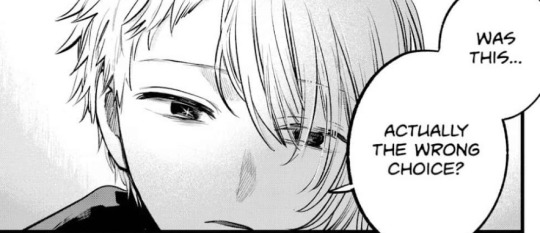
Which takes me to...
The Ugly
Turns out Kana was pretty much just a mixture between Fujiwara and Maki, after all. Except that unlike Maki, she never grows (Aqua literally has to die for her to do so) and unlike Fujiwara, she's overused instead of underused.
Aqua and Kana are portrayed as shallow to the end, and I'd even go as far as saying that the narrative pokes fun at Kana for it. Even during the funeral, she puts on a hat that's reserved for family members and it literally falls off her head when Miyako slaps her lmao
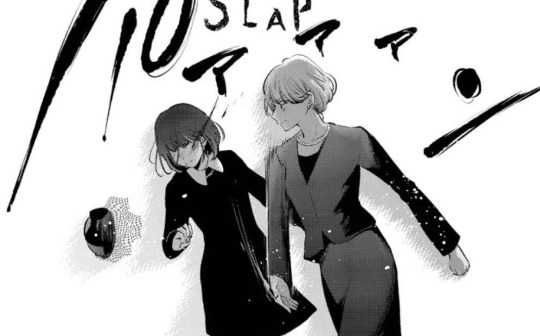
Since this is a manga and not real life, the way Kana's outburst was handled in that chapter is likely meant to be contrasted with the way Akane's own grief was handled, because it pretty much embodies all the differences between both of their relationships with Aqua through the manga.
Kana is focused on herself and on her pain. She thinks Aqua was murdered, but she still irrationally blames him for it, too blinded by her own pain. Aqua was murdered, but not being able to confess to him properly is still at the top of her list of grievances. She is also shown overplaying that one conversation she had with Aqua about Aqua having a death-wish, as if Aqua somehow agreeing to not say that he wants to die was some vital promise that he broke.
Meanwhile, Akane focuses on Aqua. On what Aqua felt, on why he did what he did, and on what he would have wanted. Even her wish to be by Aqua's side is expressed through Akane saying that she'd have been willing to shoulder his burdens with him, no matter where that led them. It is also Akane's understanding of Aqua that helps her to find some solace and to overcome his death.
Kana always looked at Aqua from the outside-in, idealizing and romanticizing him, while Akane was Aqua's partner in every sense of the word. That's why Akane gets all the insightful narration about Aqua while Kana just gets to make a fool of herself at his funeral.
So to the very end, the dichotomy between "Ai" and "Koi" does perfectly illustrates the contrast between the two sides of the Aqua love triangle.
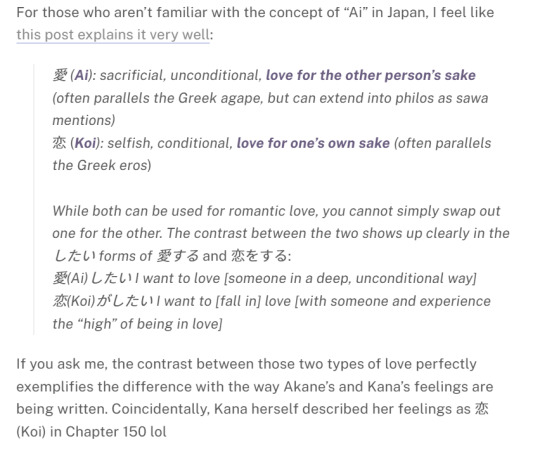
Kana was infatuated with the Aqua that she built up in her head, and focused on what she wanted Aqua to do for her (support her unconditionally), and what she wanted to be for him (his only idol), rather than on Aqua himself as a person.
As for Aqua, during his last moments, most Aqua can say about Kana is that it might be good to respond to her feelings. Might. He spends the entire story knowing Kana is at his beck and call, he even makes fun of her for it (you're so easy to manipulate, yadda yadda), yet when the opportunity to date her presents itself, most he can say is essentially "it could be cool I guess." He even pictures her pulling on his arm to get his attention, while with Akane, he pictures himself facing her and looking straight at her.
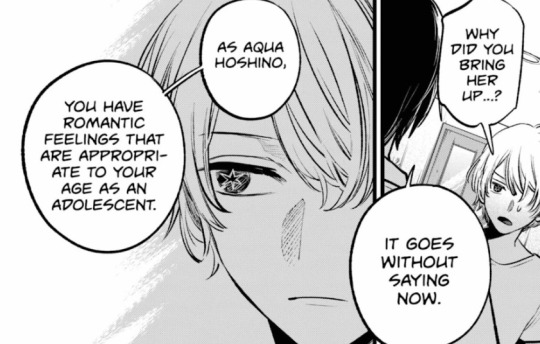
So to Aqua, Kana was at most a teenage crush. His feelings for her weren't deep or relevant enough to have any sort of impact on his character, while he outright called the year he spent dating Akane his happy days. An entire year that he spent without Kana even being in his life, mind you. Meanwhile Kana was out there living an entire shoujo where she's the heroine and Aqua is the male lead 😂
That said, I still think Aqua, who I'm sure must've broken a record at being bad at understanding his own feelings, was likely mistaking admiration for romantic attraction, and that he would've realized this pretty early into dating Kana.
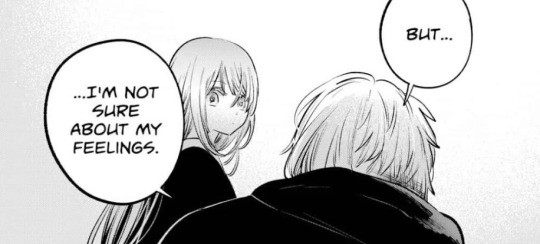
The anime is even clearer about this because Aqua's reactions to Kana are paralleled to Akane's who is, quite literally, a fan of Kana.
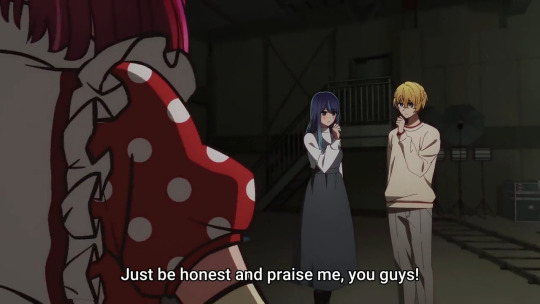
But even if he wasn't, it doesn't really matter, because it's shown very clearly that Aqua deeply values being understood (to him, it feels like salvation) and that Kana doesn't really understand him. So had they dated, Aqua would've had fun at first, sure, but his emotional needs wouldn't have been met; instead his job would've been to meet Kana's. It just would've never worked in the long term.
Now that the dust has settled, I can say for certain that if Aqua had been allowed to have a happy ending, it'd have been with Akane.
So once more, this is all fine on paper. The problem is that Aka takes it too far. The whole Kana business takes too much panel time for no discernible reason other than to... bait readers? I've even seen some say that Aka intended to mock them.
But even if that were the case, considering that those same readers are likely going to walk out of the story thinking Aqua and Kana are a tragic ship that loved each other because of all the bait, who's really the butt of the joke? Them or Aka himself?
Conclusion
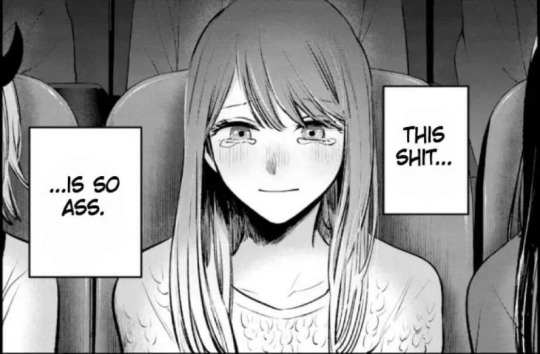
I've always been pretty clear about being an Akane fan first and foremost. Despite all my Aqua/Akane meta, I had no emotional investment in whether she ended up with Aqua or not, as long as she got a satisfying ending. That said, by principle, I most definitely didn't want Aqua to end up with Kana, because that'd be like rewarding Kana for all her crying and whining when she never even tried to understand who Aqua was as a person and I've already gone through that in Naruto, thank you very much.
So the two silver-linings about this ending are that Akane stayed amazing to the end, and that Kana didn't have Aqua handed to her on a silver platter. But considering just how much panel time Kana's meaningless crush takes up in the narrative and how side-lined Akane got after the break-up, it feels like a pyrrhic victory lol
Akane is still the best thing about the manga, and I'd say that she got by far the best ending of the bunch. I'm not sure if I'd call it satisfying, because Akane's one goal was always to save Aqua and she didn't get to accomplish that. But at the very least, she got a good ending, all things considered. She got to protect what Aqua entrusted to her, and she got to show just how emotionally strong she is.
As for Aqua and Akane, AquaKane could've been incredible if only Aka had done them justice, but he didn't. I joked before that the Aqua/Akane development was so good that it's like it wrote itself, and I actually think that's exactly what happened. Aka made things up as he went along, and he allowed Aqua and Akane to develop together in ways he didn't necessarily plan nor foresee. But as soon as he started heading towards the ending he envisioned, he dropped the ship, likely because he had already established everything that would be relevant about them by then, and then proceed to leave a lot of it to the discretion of the readers.
While I'm sure that'll be enough for some, I'm afraid it's not really enough for me. If you were to ask me if I'm satisfied with the way they were handled, my answer would be: not really, but it certainly could've been worse lol
In my opinion, they're the biggest wasted potential in the manga (which is saying something, because the entire manga is wasted potential), and their potential was wasted simply because they're the ones who could've actually led us to a happy ending.
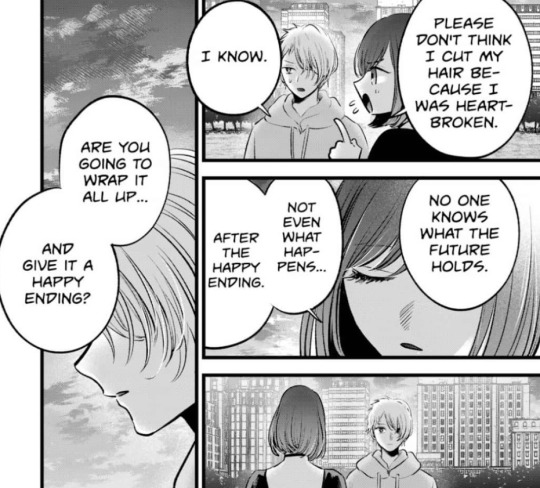
Aka didn't want that ending, though. He cared for his vision more than about his characters, and his vision was literally just an ending where poor Ruby would be a star that shines brighter "the darkest things get". Nothing else mattered. LMAO. As if Ruby hadn't already gone through enough!
Oh well, at least we're finally free!
#akane kurokawa#aquakane#aquaka#my aquakane meta#fandom: onk#it's finally over!!#I'm free!#I love you Akane but reading this manga was a nightmare lmao#I suspect some of this may not be what fellow aquaka fans want to read#but I've been honest about my thoughts all this time and I didn't want to be dishonest now lol
133 notes
·
View notes
Text
Content note for discussions of eternal damnation, and all sorts of other shit that will trigger a lot of folks with religious trauma.
Before I get started I might as well explain where I’m coming from - unlike a lot of She-Ra fans, and a lot of queer people, I don’t have much religious trauma, or any, maybe (okay there were a number of years I was convinced I was going to hell, but that happens to everyone, right?). I was raised a liberal Christian by liberal Christian parents in the Episcopal Church, where most of my memories are overwhelmingly positive. Fuck, growing up in the 90’s, Chuch was probably the only place outside my home I didn’t have homophobia spewed at me. Because it was the 90’s and it was a fucking hellscape of bigotry where 5 year olds knew enough to taunt each other with homophobic slurs and the adults didn’t know enough to realize how fucked up that was. Anyway. This is my experience, but it is an atypical one, and I know it. Quite frankly I know that my experience of Christianity has very little at all to do with what most people experienced, or what people generally mean when they talk about Christianity as a cultural force in America today. So if you were raised Christian and you don’t recognize your theology here, congrats, neither do I, but these ideas and cultural forces are huge and powerful and dominant. And it’s this dominant Christian narrative that I’m referring to in this post. As well as, you know, a children’s cartoon about lesbian rainbow princesses. So here it goes. This is going to get batshit.
"All events whatsoever are governed by the secret counsel of God." - John Calvin
“We’re all just a bunch of wooly guys” - Noelle Stevenson
This is a post triggered by a single scene, and a single line. It’s one of the most fucked-up scenes in She-Ra, toward the end of Save the Cat. Catra, turned into a puppet by Prime, struggles with her chip, desperately trying to gain control of herself, so lost and scared and vulnerable that she flings aside her own death wish and her pride and tearfully begs Adora to rescue her. Adora reaches out , about to grab her, and then Prime takes control back, pronounces ‘disappointing’ and activates the kill switch that pitches Catra off the platform and to her death (and seriously, she dies here, guys - also Adora breaks both her legs in the fall). But before he does, he dismisses Catra with one of his most chilling lines. “Some creatures are meant only for destruction.”
And that’s when everyone watching probably had their heart broken a little bit, but some of the viewers raised in or around Christianity watching the same scene probably whispered ‘holy shit’ to themselves. Because Prime’s line - which works as a chilling and callous dismissal of Catra - is also an allusion to a passage from the Bible. In fact, it’s from one of the most fucked up passages in a book with more than its share of fucked up passages. It’s from Romans 9:22, and I’m going to quote several previous verses to give the context of the passage (if not the entire Epistle, which is more about who needs to abide by Jewish dietary restrictions but was used to construct a systematic theology in the centuries afterwards because people decided it was Eternal Truth).
19 Thou wilt say then unto me, Why doth he yet find fault? For who hath resisted his will?
20 Nay but, O man, who art thou that repliest against God? Shall the thing formed say to him that formed it, Why hast thou made me thus?
21 Hath not the potter power over the clay, of the same lump to make one vessel unto honour, and another unto dishonour?
22 What if God, willing to shew his wrath, and to make his power known, endured with much longsuffering the vessels of wrath fitted to destruction:
The context of the allusion supports the context in the show. Prime is dismissing Catra - serial betrayer, liar, failed conqueror, former bloody-handed warlord - as worthless, as having always been worthless and fit only to be destroyed. He is speaking from a divine and authoritative perspective (because he really does think he’s God, more of this in my TL/DR Horde Prime thing). Prime is echoing not only his own haughty dismissal of Catra, and Shadow Weaver’s view of her, but also perhaps the viewer’s harshest assessment of her, and her own worst fears about herself. Catra was bad from the start, doomed to destroy and to be destroyed. A malformed pot, cracked in firing, destined to be shattered against a wall and have her shards classified by some future archaeologist 2,000 years later. And all that’s bad enough.
But the full historical and theological context of this passage shows the real depth of Noelle Stevenson’s passion and thought and care when writing this show. Noelle was raised in Evangelical or Fundamentalist Christianity. To my knowledge, he has never specified what sect or denomination, but in interviews and her memoir Noelle has shown a particular concern for questions that this passage raises, and a particular loathing for the strains of Protestant theology that take this passage and run with it - that is to say, Calvinism. So while I’m not sure if Noelle was raised as a conservative, Calvinist Presbyterian, his preoccupation with these questions mean that it’s time to talk about Calvinism.
It would be unfair, perhaps, to say that Calvinism is a systematic theology built entirely upon the Epistles of Romans and Galatians, but only -just- (and here my Catholic readers in particular will chuckle to themselves and lovingly stroke their favorite passage of the Epistle of James). The core of Calvinist Doctrine is often expressed by the very Dutch acronym TULIP:
Total Depravity - people are wholly evil, and incapable of good action or even willing good thoughts or deeds
Unconditional Election - God chooses some people to save because ¯\_(ツ)_/¯, not because they did anything to deserve, trigger or accept it
Limited Atonement - Jesus died only to save the people God chose to save, not the rest of us bastards
Irresistible Grace - God chooses some people to be saved - if you didn’t want to be saved, too bad, God said so.
Perseverance of the Saints - People often forget this one and assume it’s ‘predestination’ but it’s actually this - basically, once saved by God, always saved, and if it looks like someone falls out of grace, they were never saved to begin with. Well that’s all sealed up tight I guess.
Reading through these, predestination isn’t a single doctrine in Calvinism but the entire theological underpinnings of it together with humanity’s utter powerlessness before sin. Basically God has all agency, humanity has none. Calvinism (and a lot of early modern Protestantism) is obsessed with questions of how God saves people (grace alone, AKA Sola Fides) and who God saves (the people god elects and only the people God elects, and fuck everyone else).
It’s apparent that Noelle was really taken by these questions, and repelled by the answers he heard. He’s alluded to having a tattoo refuting the Gospel passage about Sheep and Goats being sorted at the end times, affirming instead that ‘we’re all just a bunch of wooly guys’ (you can see this goat tattoo in some of his self-portraits in comics, etc). He’s also mentioned that rejecting and subverting destiny is a huge part of everything he writes as a particular rejection of the idea that some individual people are 'chosen' by God or that God has a plan for any of us. You can see that -so clearly- in Adora’s arc, where Adora embraces and then rejects destiny time and again and finally learns to live life for herself.
But for Catra, we’re much more concerned about the most negative aspect of this - the idea that some people are vessels meant for destruction. And that’s something else that Noelle is preoccupied with. In her memoir in the section about leaving the church and becoming a humanistic atheist, there is a drawing of a pot and the question ‘Am I a vessel prepared for destruction?’ Obviously this was on Noelle’s mind (And this is before he came out to himself as queer!).
To look at how this question plays out in Catra’s entire arc, let’s first talk about how ideas of damnation and salvation actually play out in society. And for that I’m going to plug one of my favorite books, Gin Lun’s Damned Nation: Hell in America from the Revolution to Reconstruction (if you can tell by now, I am a fucking blast at parties). Lun tells the long and very interesting story about, how ideas of hell and who went there changed during the Early American Republic. One of the interesting developments that she talks about is how while at first people who were repelled by Calvinism started moving toward a doctrine of universal salvation (no on goes to hell, at least not forever*), eventually they decided that hell was fine as long as only the right kind of people went there. Mostly The Other - non-Christian foreigners, Catholics, Atheists, people who were sinners in ways that were not just bad but weird and violated Victorian ideas of respectability. Really, Hell became a way of othering people, and arguably that’s how it survives today, especially as a way to other queer people (but expanding this is slated for my Montero rant). Now while a lot of people were consciously rejecting Calvinist predestination, they were still drawing the distinction between the Elect (good, saved, worthwhile) and the everyone else (bad, damned, worthless). I would argue that secularized ideas of this survive to this day even among non-Christian spaces in our society - we like to draw lines between those who Elect, and those who aren’t.
And that’s what brings us back to Catra. Because Catra’s entire arc is a refutation of the idea that some people are worthless and irredeemable, either by nature, nurture or their own actions. Catra’s actions strain the conventions of who is sympathetic in a Kid’s cartoon - I’ve half joked that she’s Walter White as a cat girl, and it’s only half a joke. She’s cruel, self-deluded, she spends 4 seasons refusing to take responsibility for anything she does and until Season 5 she just about always chooses the thing that does the most damage to herself and others. As I mentioned in my Catra rant, the show goes out of its way to demonstrate that Catra is morally culpable in every step of her descent into evil (except maybe her break with reality just before she pulls the lever). The way that Catra personally betrays everyone around her, the way she strips herself of all of her better qualities and most of what makes her human, hell even her costume changes would signal in any other show that she’s irredeemable.
It’s tempting to see this as Noelle’s version of being edgy - pushing the boundaries of what a sympathetic character is, throwing out antiheroics in favor of just making the villain a protagonist. Noelle isn’t quite Alex ‘I am in the business of traumatizing children’ Hirsch, who seems to have viewed his job as pushing the bounds of what you could show on the Disney Channel (I saw Gravity Falls as an adult and a bunch of that shit lives rent free in my nightmares forever), but Noelle has his own dark side, mostly thematically. The show’s willingness to deal with abuse, and messed up religious themes, and volatile, passionate, not particularly healthy relationships feels pretty daring. I’m not joking when I gleefully recommend this show to friends as ‘a couple from a Mountain Goats Song fights for four seasons in a cartoon intended for 9 year olds’. Noelle is in his own way pushing the boundaries of what a kids show can do. If you read Noelle’s other works like Nimona, you see an argument for Noelle being at least a bit edgy. Nimona is also angry, gleefully destructive, violent and spiteful - not unlike Catra. Given that it was a 2010s webcomic and not a kids show, Nimona is a good deal worse than Catra in some ways - Catra doesn’t kill people on screen, while Nimona laughs about it (that was just like, a webcomic thing - one of the fan favorite characters in my personal favorite, Narbonic, was a fucking sociopath, and the heroes were all amoral mad scientists, except for the superintelligent gerbil**). But unlike Nimona, whose fate is left open ended, Catra is redeemed.
And that is weird. We’ve had redemption arcs, but generally not of characters with -so- much vile stuff in their history. Going back to the comparison between her and Azula, many other shows, like Avatar, would have made Catra a semi-sympathetic villain who has a sob-story in their origin but who is beyond redemption, and in so doing would articulate a kind of psychologized Calvinism where some people are too traumatized to ever be fully and truly human. I’d argue this is the problem with Azula as a character - she’s a fun villain, but she doesn’t have moral agency, and the ultimate message of her arc - that she’s a broken person destined only to hurt people - is actually pretty fucked up. And that’s the origin story of so many serial killers and psycopaths that populate so many TV shows and movies. Beyond ‘hurt people hurt people’ they have nothing to teach us except perhaps that trauma makes you a monster and that the only possible response to people doing bad things is to cut them out of your life and out of our society (and that’s why we have prisons, right?)
And so Catra’s redemption and the depths from which she claws herself back goes back to Noelle’s desire to prove that no person is a vessel ‘fitted for destruction.’ Catra goes about as far down the path of evil as we’ve ever seen a protagonist in a kids show go, and she still has the capacity for good. Importantly, she is not subject to total depravity - she is capable of a good act, if only one at first. Catra is the one who begins her own redemption (unlike in Calvinism, where grace is unearned and even unwelcomed) - because she wants something better than what she has, even if its too late, because she realizes that she never wanted any of this anyway, because she wants to do one good thing once in her life even if it kills her.
The very extremity of Catra’s descent into villainy serves to underline the point that Noelle is trying to make - that no one can be written off completely, that everyone is capable of change, and that no human being is garbage, no matter how twisted they’ve become. Meanwhile her ability to set her own redemption in motion is a powerful statement of human agency, and healing, and a refutation of Calvinism’s idea that we are powerless before sin or pop cultural tropes about us being powerful before the traumas of our upbringing. Catra’s arc, then, is a kind of anti-Calvinist theological statement - about the nature of people and the nature of goodness.
Now, there is a darker side to this that Noelle has only hinted at, but which is suggested by other characters on the show. Because while Catra’s redemption shows that people are capable of change, even when they’ve done horrible things, been fucked up and fucked themselves up, it also illustrates the things people do to themselves that make change hard. As I mentioned in my Catra rant, two of the most sinister parts of her descent into villainy are her self-dehumanization (crushing her own compassion and desire to do good) and her rewriting of her own history in her speech and memory to make her own actions seem justified (which we see with her insistence that Adora left her, eliding Adora’s offers to have Catra join her, or her even more clearly false insistence that Entrapta had betrayed them). In Catra, these processes keep her going down the path of evil, and allow her to nearly destroy herself and everyone else. But we can see the same processes at work in two much darker figures - Shadow Weaver and Horde Prime. These are both rants for another day, but the completeness of Shadow Weaver’s narcissistic self-justification and cultivated callousness and the even more complete narcissism of Prime’s god complex cut both characters off from everyone around them. Perhaps, in a theoretical sense, they are still redeemable, but for narrative purposes they might as well be damned.
This willingness to show a case where someone -isn’t- redeemed actually serves to make Catra’s redemption more believable, especially since Noelle and the writers draw the distinction between how Catra and SW/Prime can relate to reality and other people, not how broken they are by their trauma (unlike Zuko and Azula, who are differentiated by How Fucked Uolp They Are). Redemption is there, it’s an option, we can always do what is right, but someone people will choose not to, in part because doing the right thing involves opening ourselves to the world and others, and thus being vulnerable. Noelle mentions this offhandedly in an interview after Season 1 with the She-Ra Progressive of Power podcast - “I sometimes think that shades of grey, sympathetic villains are part of the escapist fantasy of shows like this.” Because in the real world, some people are just bastards, a point that was particularly clear in 2017. Prime and Shadow Weaver admit this reality, while Catra makes a philosophical point that even the bastards can change their ways (at least in theory).
*An idea first proposed in the second century by Origen, who’s a trip and a fucking half by himself, and an idea that becomes the Catholic doctrine of purgatory, which protestants vehemently denied!
**Speaking of favorite Noelle tropes
248 notes
·
View notes
Text
pirate king (83) || atz

The blade seems to sing in the ghostly light of the half moon as you take one step, then another, down the length of the ship. The deck seems to have been vacated, silent and empty, but you’re screaming inside your mind for someone, anyone, to step out and see what you’re doing - to stop you from what you’re about to do.
No one does. All you hear is the sound of the sea, waves lapping against the shore, pulling your mind into a trance like quicksand, impossible to escape from. You take another step forward, and just like that, and you’re at the door to the captain’s cabin - the light from the lamps inside flickering across your face.
One step away from committing an unforgivable sin.
You raise your hand to the door, knocking three times, the other clutching the blade behind your back.
Please don’t respond, you beg, screaming through the haze of your mind. You feel like you’re merely watching your actions play out in front of you, completely unable to control your body in the least. Keep seeing me as a monster, be afraid of me. Don’t open the door!
The door swings open.
There he stands in the doorway, eyes tired, but a gentle smile on his face. You would rather it be twisted with wariness, with hate, with anything but that guileless expression. Your fingers tighten around the handle, the carved decorations carved into steel digging into your skin.
“Kill the human captain, and return to whence you came.”
When he sees you, he steps back, holding the door open a little wider so that you can come in. You curse yourself, desperately trying to resist the powerful magic of the reflection in the water, but your feet start to move forward of their own accord.
“Yeosang decided to bed down with Wooyoung in the hammocks tonight, to give me some time alone to think.” Hongjoong says, closing the door behind the two of you as you turn around to face him, effectively hiding the blade with your body. “I just... It’s good that you came. There’s much...” He hesitates, taking you in with his one good eye, unfathomable sorrow flickering in its depths. “There’s much that we need to talk about.”
You don’t say a word, lips clamped firmly shut. Your mind, however, screams with the effort to move your mouth, a warning, a cry, something!
“About what we were saying earlier, I’m sorry about it.” Hongjoong’s words are low, regretful as he leans against the table in the middle of the room. Too far for you to stab without alerting him, the dark voice in you whispers. A tiny fraction of relief spills across you. “Jongho doesn’t mean any ill will, he was just being cautionary, and-”
“He’s not wrong.” The words escape your mouth without your permission. “I almost killed someone. It’s right for you to be cautious of me.”
Hongjoong nods, looking relieved that you understand. It’s not me, you want to cry. Get away from me, as fast as you can! “So, what are you going to do about the Royal Navy?”
Hongjoong gives you a faint, little smile. “Well, it might be the last battle that the Treasure will see.” He says softly, and you have to strain your ears to catch his words. “There’s no other way but to fight, after all.”
Dread wells up inside of you. Is there truly no way to save the Treasure? In the end, it’s all because of you that the Treasure has gotten mixed up with the Royal Navy in the first place, so what if they could just...
You have no soul, so if the heart of the sea were to be robbed from you, you would cease to exist. All traces of your existence would be wiped from this earth like a blank slate. None of your so called family would be able to remember you, much less your existence nor sacrifice.
Your breath catches in your throat.
But... they won’t even remember you.
All the memories you’ve made with them, the first time you had gone drinking with them in the tavern, to learning how to use a sword with Jongho and Yunho, from the time Hongjoong had journeyed with you through the sea witch’s lair, to sitting on the pink beaches of Eleuthera with Mingi. Learning how to cook with Seonghwa and Yeosang saving you from a bullet. Embracing in the darkness of nightmares with San and sitting on the masts with Wooyoung to watch the sunrise.
They’re all going to be erased.
All gone.
This entire life would have been worth for nothing.
“But I have a plan.”
Your eyes widen at the news, and you look up to see your captain with a shadowed, pensive expression on his face. “Earlier today, while you were still unconscious, an envoy from the Royal Navy approached us. He said that the commander-” you catch the almost imperceptible grit of his teeth, “-would be willing to speak to us on a small island somewhere between where the two of us are now. A no man’s land, if you will. To, well, negotiate.”
That can’t be right, you think, confused. The Royal Navy clearly has the upper hand in this situation, so why would they be willing to negotiate?
“Of course I know it could be a trap.” Hongjoong’s sigh breaks your train of thought, and you look up to see him running a hand through his hair. “But it’s the best option that we have now. Wooyoung, Yeosang and I will be going tomorrow while the rest of the crew will be targeting the command ship, so I want you to stay with San - safe and out of sight.”
You want to argue. It’s got to be a trap, you can’t just go blindly walking into it like that! But you only nod, quiet and accepting, eyes downcast. The sides of Hongjoong’s mouth turns up in a sad smile.
“Good girl.” He exhales, breath a little shaky - he must be afraid, too. “We’ll come back to you, alright? Since you promised me that you’d stay alive, I need to do so too, am I right?”
If you were in control of your own body right now, you would have burst into tears at his words. The weight of the dagger is heavy in your had, yet you can’t let go of it, metal seared to your skin. Hongjoong rises to his feet, turning away from you to look over the map spread out over his table. “If it all goes according to plan tomorrow, we’ll be able to escape.”
His back is turned to you.
You frantically try to scream, to make him turn around, to warn him somehow, but your body refuses to listen to you. You rise from the bed, dagger clutched in hand, taking slow, measured steps towards him.
No!
“It’ll be a narrow chance, of course, but it’s still better than giving you up to the Royal Navy.” Hongjoong continues to speak, tracing the map with a finger. Your hand is trembling, as you desperately attempt to wrench your hand away from its intended path - you won’t let yourself hurt your captain, not now, not ever.
Don’t do it, you beg yourself. Please, don’t make me do this. I’d rather die than hurt him like this-
Despite your best efforts, however, your arm raises the blade high into the air, your eyes fixed firmly on the side of his neck, where warm lifeblood flows the strongest. Just one slash, quick and clean, and you’ll be free once again-
All of a sudden, there’s a wicked fast flash of silver, and the point of something cold presses to the tip of your throat.
You find yourself staring down a long silver blade, a single cold, green eye reflected in vicious steel. A bead of cold sweat trickles down the back of your neck as you look up to see the man in front of you.
Hongjoong looks terrifying.
Fear, nauseating and dizzying, gnaws at the pit of your belly as you freeze, too scared to move an inch. You’ve seen him give enemies this stare many times, but it’s never once been directed at you, and you’re so, so afraid.
“You’re not Chin Hae.” Hongjoong’s voice is cold, measured. His blade doesn’t waver in the least as he stares you down, fearless light in his eyes identical to the ones that burn when he faces down insurmountable waves and impossible odds. “What are you?”
Your body doesn’t react for a moment, before a high, cold laugh suddenly spills forth from your lips. “So, you know her far better than I thought you would. How did you tell?”
Hongjoong lets a snort escape him, not amused in the least. “From the very second you stepped into the room. The last thing Chin Hae saw before she fainted was her patient being shot. Knowing her, he would have been the first thing she asked after.”
Your heart clenches. He knows.
“Secondly, when I told you about my plan to take the commander of the Royal navy hostage, you didn’t argue.” Hongjoong continues, grip on his sword cutlass tightening. “The real Chin Hae would have protested, asked me to give her up to the Royal Navy instead, because she’s selfless like that. You’re not her.”
“So, you’re observant.” Your tongue flicks out to swipe at your lips, head tilting to the side, uncaring in the least of the blade at your throat. “That is truly a pain to deal with.”
“Get out of her body.” Hongjoong’s lips curl back into a snarl. “I don’t care who or what you are. Leave Chin Hae alone.”
Your voice leaves you in a mocking hum. “You mean, leave her to die in your arms, human captain?”
At the words that your mouth utters, Hongjoong stills, his eye going wide with shock. Your heart plummets into the pit of your stomach, horror spiking through you. Silence looms heavy and oppressive over the two of you.
He looks terrified.
“What?” He finally utters, voice cracking with what you know as fear. Another laugh escapes your mouth, mocking him, taunting him. “Oh dear... seems like the two of you weren’t quite as close as you wish you were, captain... she must not have told you.”
That’s not it! You scream into the dark recesses of your mind. I just... I just didn’t want you to worry, I just couldn’t bear to see you hurt. Hongjoong, please, don’t think that way...
You remember the last time he had clung to you, like you were the only anchor in the middle of his storm. The way he had broken down in your arms, had wept for you and the crew is still fresh in your mind.
While Hongjoong is distracted, your body takes the opportunity to strike. Lashing out with the blade, your hand curves down in a sweeping arc, aiming straight for the jugular at his neck. He barely manages to react in time, diving out of the way before the blade sinks into the wood of the table, splitting it clean down the middle in a show of strength you’ve only witnessed once in your life.
“Perhaps she thought of you as unreliable to trust.” Your voice coos, voice sickly sweet with false sympathy as you raise the blade again. Raising the blade once again, you swing at him faster than you’ve ever moved before.
Hongjoong curses, dodging to the side and the blade narrowly shaves off a few strands of hair from the back of his head. They go fluttering in the air, but before they can even reach the ground, you’re already lunging for him once again in a jab to the throat.
Your captain, unable to react in time, grabs the blade by the hand, stopping it right before it can pierce his neck. Hot, red blood, however, flows crimson down his palm and onto the ground, staining the blade of the knife. Horror lurches in your chest.
He’s hurt!
Ducking around you so swiftly that you can barely follow his movements with your eyes, Hongjoong pulls on you hard, arms wrapping around you and yanking you into his chest. “Stop fighting!”
Your body lashes out with inhumane strength, and Hongjoong is flung into one of the bookshelves lining the walls. Books fall all around him, scattered on the ground, and Hongjoong lets out a moan of pain that tugs at your heartstrings - you hurt him.
A sob almost leaves you. You hurt him. He was just trying to protect you, and you hurt him like that with your own hands.
“You’re remarkably curious, human captain. It’s rather entertaining to see what that bloodied boy on the beach has grown up into.” At your words, a low growl leaves Hongjoong’s lips, more animal than human. “In your hand there is a drawn sword, yet you have not used it. Are you truly afraid that you might hurt her?”
Your heart breaks as Hongjoong struggles to his feet, using his sword to prop himself up. One of his hands are pressed against his side, possibly a broken rib, you realise. And yet, he’s still wearing that indomitable expression on his face, unwilling to give up.
“You’re still standing? You humans are really so interesting.” Your voice is teasing, the dagger in your hand raised once again. “Human captain, since you’ve impressed me, let me tell you something. Did you know that killing you will save Chin Hae’s life?”
Hongjoong’s uncovered eye flies open in shock, and he blinks at you, unable to speak. “Wha-” Instantly, you’re terrified. he had said once before that he would rather willingly take on all the pain alone than see any of you suffer, so what if he... no, you don’t dare to so much as think about it, but...
“Only killing you will be able to save her, human.” Your mouth moves on its own, without your permission. “If you truly care about her, you’d die for her, wouldn’t you?”
Terror immediately floods through you, so acute that you feel like you’re falling apart, piece by piece. She’s lying, you want to say, even though you know she’s not. Anything to stop that sudden hopeful light in his eyes, the way his eyes fix on the knife in your hand as if that’s the only thing they see. “That’s all? Just my life?”
Just his life? Ache wells up in you, so fierce it hurts you from deep within. What does he mean, just his life? Does he really intend to die for you, just like that?
“You can tell I’m not lying, human.” Your voice sinks into a dark, enchanting purr, almost hypnotic. You take one step forward, another and another until you’re crouched in front of him, blade in hand. The expression on Hongjoong’s face could break your heart clean in two. His eyes search yours, a pained smile on painted on his lips.
I’m sorry.
Your hand raises the blade into the air.
“I’ll make it quick for you, favored one.”
A silver crescent cuts across the air.
The blade comes down.
#ateez#ateez fanfic#ateez fanfiction#hongjoong#seonghwa#yunho#yeosag#san#mingi#wooyoung#jongho#ateez pirate king#w; pirate king#a; ot8#w; fanfiction
88 notes
·
View notes
Text
CSI: Harvest and No Humans Involved
So my latest mini-marathon involved the first half of Season 5. Among other observations, I have always linked these 2 episodes in my mind, probably because they both deal with the needless death of children at the hands of the very persons who should have been taking care of them. Not unsurprisingly, they were both scripted by Judith McCreary.
In terms of the larger GSR arc, it struck me how the two episodes elucidate the very similar and personal responses of Grissom and Sara to the neglect and abuse of children. Harvest focuses more on Grissom, and NHI on Sara. Moreover, inherent in both cases are aspects which cause the 2 CSIs to confront pieces of their pasts.
In Harvest, we learn the young girl was brought into the world for the sole purpose of keeping her older brother alive: a genetic match whose blood and marrow could be mined from her to stave off leukemia in him. When the brother decides to put her out of her misery, with what he sees as a mercy killing, his family closes ranks and attempts to frame a pedophile for her death.
Grissom and Sara get the first hint that something is not what it seems when they search Alicia's room and discover she was surfing organ transplant sites. When Sara opines that it is a little over a 7th grader's head, we get the only GSR "moment" in either episode; Grissom tells Sara he bets she was a pretty smart 7th grader. Shortly thereafter they discover Alicia had a crush on a boy named Jimmy Jones, and they meet her brother, Daniel, who is obviously not well. In her diary, they learn there was to be an upcoming surgery.
The boy, Jimmy, tells Brass and Catherine about a creepy guy who watched them. Nick plots the locations of registered sex offenders, and the team focuses on one Marlon Waylord, who fits Jimmy's description and the one Alicia's sister gave. While the pedophile turns out to be a dead end, we are shown Grissom's utter contempt for him.
After Alicia's body is found, and the investigation rules out all other viable suspects, both autopsy and the blood evidence lead Grissom to the unmistakable conclusion that Daniel killed his sister, misguidedly thinking he was sparing her from further pain on his behalf. When he asks where he is, he is told he is in church.
Grissom can't comprehend why Daniel thought it was a mercy killing, telling him it was an execution. He asks him why he didn't kill himself instead. Daniel's answer makes his head spin: because suicide is an unforgivable sin. "But you believe your God forgives murder?" Daniel then thanks him for being the only person who ever cared about Alicia. "You may not believe in God, sir but you do his work."
We are left with the image of Grissom staring up at the image of Jesus, a look of incomprehension on his face. The episode gives us insight into perhaps some of the reasons Grissom has struggled with the concept of faith in general and organized religion in particular. He cannot subscribe to a dogma that places a harsher penalty on suicide over the murder of a child.
While we are never given any timeline for Grissom's break with the Catholic Church, the fact that empirical science is the one thing he wholeheartedly embraces and believes in seems to be a core part of his character for at least as long as he has been a CSI.
In No Humans Involved, it is Sara who comes face-to-face with a family member who allows her own nephew to starve to death under her watch. Interestingly, she works primarily with Greg, who seems to have even more trouble coming to terms with the dead child than she does. Her other main interactions are with Brass and Doc Robbins, as she obsessively seeks to learn the identity of the child.
When the child's former foster mother becomes a possible suspect in his abuse, Sara's interactions with one of her fosters tells us more about her past than we heretofore had been granted privy to. Sara had been "in the system" for quite a while, although we do not yet know why. Through her interactions with Glynis, Sara learns that the boy had two brothers and that their mother had reclaimed them.
(It turns out that the mother had snapped and assaulted her abusive boyfriend with a brick and was given 90 days for assault.)
The investigation leads them to a hooker named Divine, who turns out to be the boys' mother's cousin. Apparently, she left her sons with her to pursue a job in Seattle. Divine made no effort to take care of them, locking them in a storage shed with no food, spending the money their mother had sent for them on a new TV. Brass, Greg and Sara find the two older boys just in time.
While Sara remains under control throughout this case, she is confronted by a number of "hot-button" issues during its run: child abuse, domestic abuse, foster care. The end of the episode shows Sara sitting alone at a computer. She sees Sophia in Grissom's office seemingly actively flirting with him; she looks to the left and sees the guys goofing around in the break room; she sees Catherine in the hallway, pause, look at the guys and then at her watch, and she departs. Sara glances right again and then types in the search field: THE PEOPLE VS. LAURA SIDLE W/2 MODESTO, CA 1984.
If Nesting Dolls is the watershed episode, not only for GSR but also for our understanding of one Sara Sidle, No Humans Involved is the prequel. While Sara's empathy for the abused children is in no way new, that we learn she was in foster care and that her mother was prosecuted for something is. Of course, at this point, it's out of context. It is possible we can see this case as a kind of trigger for her: the events of the case are so close to her own experience that it prompts her to seek out information about her past. Reliving her childhood trauma, even by way of a legal document, may be directly causal to her losing it in ND.
(As an aside, I do not read her as jealous of Sofia here. In Snakes, she seems to have become reconciled to the fact that she will always love Grissom but that they are not in the cards. I do think she's jealous in Unbearable, as that occurs after whatever happened between them offscreen in ND.)
Finally, I will probably always think of these two episodes as companion pieces, not only because they deal with similar premises but because of how they offer pieces of insight into Grissom and Sara.
That and the fact they are both horrifying: two children are sacrificed on the altar of adult selfishness.
9 notes
·
View notes
Text
Thoughts on Fruits Basket 2019 2nd Season Ep25 [”I’m Different Now”]:
For the season finale [but not series finale, because they’ve already announced a third and final season for next year], we get a huge plot twist that completely changes our perspective on one of the characters, and their various relationships, in a way that has major implications about the future of the story and how things will progress.
Aside from all that, we also get the world’s worst gender reveal party.
Thoughts under the cut.
Just to start off, this episode adapted chapters 96 and 97 like I figured it would, to wrap up this season with a big cliffhanger to hype people up for the final season. And for better or worse, this was a pretty much 1:1 adaptation of these chapters, so there’s not really any differences to talk about that I noticed.
Anyway, I may as well just cut right to the chase and talk about the whole Shocking Gender Reveal Plot Twist[tm], now that that’s out in the open and everyone can stop tiptoeing around it.
It’s not like I’ve really tried to hide it or how I feel about it as a plot point before this, but I really do dislike it on basically every level. There’s a whole lot to unpack about it, but really at the end of the day it’s just one of those old-fashioned plot devices where we’re meant to think that someone being a different gender to what you thought they were is inherently something scandalous and shocking. They could have at least immediately started talking about the idea of her being raised as a man against her will, since that’d at least give it some actual meaning and value, but they don’t, which really says a lot about how that’s actually kinda just a foot-note that the story doesn’t dwell on much, and in practice we’re just meant to be surprised that she’s a girl.
It doesn’t really help that the season just ends right there, when in the manga this whole sequence keeps going in the next chapter, and I think they start touching upon that part of Akito’s backstory then, but the anime won’t get into that until next year at this point, so I think it’s fair to take it as it’s presented right now.
The idea of Akito being a girl is surprising in basically the exact same way that it’d be surprising if we found out that Haru was a Sanrio fan, or something. That is to say, it’d be vaguely surprising, but then we’d all just go on with our lives.
Even at this point you can definitely guess that there’s probably something going on with her being forced to present as a man, but it hasn’t really been explained or touched upon yet, so it’s all pretty nebulous, at least from the perspective of someone like Tohru who barely knows Akitto at all and doesn’t know all the stuff about her past that Kureno does.
In general I’ve never been a fan of this entire trope to begin with, but I think it’s made a lot worse by the fact that, as you get further into the rest of the story, it becomes clear that it’s not even that important, and the majority of what’s going on with Akito’s character has much more to do with the curse situation and how it impacts her relationship with the zodiac members. The whole deal with her character is how being the god of the zodiac from birth forced her to be pretty much raised in seclusion, with her only frame of reference for human relationships being abusive cult behavior. She’s miserable and twisted because she isn’t allowed to live a normal life due to her status, and her possessiveness gets enabled by the people that she clings onto, putting her into a loop of arrested development and mental instability.
And literally none of that has anything to do with her gender, lol. None of it would be different if she was a cis man, or if she had been raised as a woman. Because that whole deal isn’t actually all that relevant to why she is the way she is, why she has the attitude and world-view that she does, and why her relationships are so fucked up. Even if you decided to write out her romantic/sexual relationships with people like Kureno and Shigure by having her be a man, that’d barely change anything about the story as a whole, because even if it was entirely for platonic reasons Kureno would have still decided to stay with Akito and ultimately enable her actions, and Shigure would most likely still more or less do all the same things he’s already done. And obviously to begin with, if Akito was actually a dude that wouldn’t even necessarily mean you couldn’t still have some of these relationships play out this way, so you can’t even really act like the story required her to be a girl for that reason, lol.
And for better or worse, if Akito was written as a gay dude, it could still totally have lead to all the same stuff with her possessiveness over the male zodiac members, and her irrational hatred of the female zodiac members. It’d just be a different, more homophobic sort of trope than what actually happens, in a way that plays out in basically the exact same way. It wouldn’t be the first time we’ve gotten a villain who’s a gay dude that irrationally hates women for Reasons [tm], and who has ominous and sinful relationships with men.
Which is also the reason why I don’t exactly think the story would be ‘better’ if she had been written as a gay dude, or as a trans woman, or anything like that. With her whole role in the story to begin with, it’d play out in an obnoxious way no matter what. Mostly I just kinda wish they had completely avoided this sort of outdated, schlocky storytelling to begin with, and just focused entirely on the more interesting stuff about her character.
And in terms of outdated tropes, we haven’t even gotten properly introduced to Ren yet, lol.
I’m also assuming that they’re not exactly planning to change anything about this in the anime, so I’m just going with my existing thoughts about how the manga handled it, since that should still carry over to the anime.
I know that this is all just beating a dead horse with a stick because of how long the series has been out for, but I still just can’t help but be irritated by this whole mess.
I don’t want to spoil it too much, but I think a good comparison to make is the recent Banana Fish adaptation, and how from what I gathered, most people’s reactions to that series’ ending was ‘I know it’s just a product of it’s time, but this is just kinda unironically shitty’.
Ultimately, I think a big part of why this annoys me so much is because I actually really like Akito’s whole character and what the story does with her after this point. I just dislike how it’s shackled to this unnecessary plot twist that ends up dominating the conversation surrounding her even though it’s barely relevant to anything after this in the story.
The stuff with her being the god of the zodiac and how much it fucks up her entire life and all of her relationships is genuinely really compelling, and represents an integral part of the story’s overall message about the nature of abusive families and cults, and the various ways they end up hurting everyone inside them. Her whole arc is about learning how to embrace a life that’s not based around being a god surrounded by their followers, and I think that aspect of it works really well, especially with how it ties into all the stuff with Tohru later on.
I also think that all the stuff with Kureno that gets revealed in this episode is genuinely really interesting, and is ACTUALLY a plot twist that meaningfully shakes things up, and people actually have a reason to be surprised by it. Especially Tohru, since her whole goal at this point is to break the curse, and now she’s literally found someone who’s already had their curse get broken. It’s basically the first major lead she’s found in her whole search for answers, but in the end it kinda just, y’know, gets overshadowed by the gender reveal and her being shocked about that instead.
It’s also still really interesting to me how the Kureno situation is basically the only time where the story seriously talks about the implications of the animal transformation part of the curse, and how someone in the zodiac might internalize that part of themselves. Most of the time, the animal transformation part of the curse is kinda irrelevant, and the series could work in 99% the same way without it. I think Takaya’s literally said before that she didn’t even plan to include that whole aspect of the story until her editor suggested it fairly late into the process, and I think that shows with how it’s kinda just there for some wacky hijinks early on, and then it just gets benched in favor of the actual stuff Takaya wanted to write about.
But with Kureno we actually get a look into what it meant for him to be able to literally turn into a bird, and how losing that ability affected his sense of identity and how he engaged with the world. It’s still ultimately just metaphorical in it’s own way, but it still feels like more of an acknowledgement of the fact that they literally turn into animals than basically any other part of the story, lol. And in general I just think it’s at least compelling on paper that he ends up shackling himself of his own free will, because that sense of freedom and disconnect made him feel obligated to stay with Akito to ‘make up for it’.
I just wish that Kureno as a whole was interesting enough for me to actually care that much about all of this, lol. In the end he’s just kinda intentionally boring, and it’s more interesting to write about his role in the story than it is to actually, like, watch him do stuff as a character. Which I guess is all just part of how much it bugs me that all of the interesting stuff in this episode, and this whole part of the story, feels like it gets overshadowed and drowned out by a dumb shock value plot twist.
There’s also all the thematic stuff with how he’s basically Tohru if she was taken advantage of and had all of her own bad habits enabled until she ended up barely being a functioning adult. He even has his whole personal conflict about feeling like moving on with his life and developing new relationships is an act of betrayal towards someone that he really needs to let go of at this point. But then you just get into the whole Uo thing and how their whole relationship is about as compelling as the whole Cinderella plot that it’s clearly a reference to, and aaaaaaah why is this series so frustrating, lol.
Really, the fact that I can gripe so much about stuff like this just goes to show how much I like the series in general, since I can’t muster up any strong feelings about stuff like this if I just straight up dislike it as a whole. At least for me, stuff like this is much more frustrating when it’s one part of a larger story that I really love. Thankfully there’s more good than bad when it comes to this series, so I can still hold onto it as a personal fave that I just happen to have complaints about.
I’m genuinely really excited for the final season, in spite of all this, since there’s a whole lot I love about the final third of the manga, and in a funny way, the fact that Akito being a girl isn’t actually that big of a deal in the long run, and what actually happens with her as a character after this is more about her status as the god of the zodiac, actually means that I’ll [mostly] enjoy a lot of it. It’s mostly just this specific part where we get the Big Reveal [tm] itself, and the immediate lead-up to it, that bugs me.
Anyway, as a whole, I still think this is a good episode that serves as a fitting cliffhanger for the season. The actual plot twist that most of the episode focuses on is really good, and serves a really meaningful role in progressing the story, and it gives a pretty clear picture of how we’re entering the final act of the story.
Hopefully the final season will start in April next year like the first two seasons did, but it’s entirely possible it might get delayed because of the whole pandemic situation. But I could live with them holding off on starting the final season until it’s ready to come out.
Also, before I forget, they haven’t said anything about it, I’m pretty sure the final season will also be around 25 episodes long. With how many chapters they have left, if they stick to the same two chapters per episode pace that the anime’s had on average thus far, they could easily cover the rest of the story in 22 episodes, which would be a lot easier to expand by an extra two or three episodes, than it’d be to condense it all the way down to 13 or so episodes.
#murasaki rambles#Fruits Basket#can you tell that I have Feelings [tm] about this whole part of the story? lol
16 notes
·
View notes
Text
SnK 128 Thoughts
Pacing, I think, is the single most difficult thing to do correctly when telling a story. Out loud or in text, you have to juggle every cue you’re giving off, keep it all relevant, and make it so when things fall into place, they’re falling to the gravity that the story’s been given.
That’s why we’ve got something of a problem in this arc.
I complain a lot, because it’s easy, and this is hardly a flawless work. Organization has also been one of the regular things this series just has trouble with.
Still, while I really feel that the last few chapters aren’t the best way to tell this story, the story chosen is a monster to keep in line.
[insert amusing pre-cut joke of your choice here]
Conflict is the root of every story. Character vs self. Character vs character. Character vs nature. Pick one, then plant the seed and watch the clash reform the setting. Knowing your protagonist often involves knowing your villain.
Eren has always been the best protagonist for this series. He embodies the fury of humanity in an environment that embraces complacency. He is the voice that shouts for people to do something.
Back in Trost, everyone on his starting squad plans on picking the Survey Corps. Because of his constant, unfettering influence. He’s the one who is always reminding them that there’s a world outside that they’re abandoning. He never lets Jean forget it. He interrupts parties with the vocal equivalent of hammering 99 problems to every door.
Eren is one of the top ten soldiers in the 104th, and he makes sure everyone knows what he’s using his skills for. And before they themselves are confronted with what’s being asked of them to join him, everyone in his social circle is ready to make the same choice.
Moving forward is what Eren does in a world that’s been trapped in stagnation. He is a force of change. He is a force of impotent rage in the face of disaster.
He is every reaction the humans inside the walls don’t have, because as a people, they can’t imagine what there is to be done about their problems. Staying within the safety of the walls and limiting their potential in return for not dying a bloody death seems fair, to them.
They are imprisoned, so Eren, our protagonist, seeks freedom.
Being born free is the linchpin of his first successful transformation.
His first rather disturbing act of violence comes from him murdering slavers.
The wings of freedom are the iconic brand of his chosen military branch.
Subtlety.
That’s all very straightforward and simple to work with.
Then we open up the setting, and things are still rather simple, just in a turn that kicks off one hell of a problem.
The world itself is a cage. Physically, in the form of internment camps, or culturally, in the form of how people think about each other and act. There is no freedom for the citizens of Paradis now that they have broken out of their shell. There is just another prison, and a ticking time bomb.
Naturally, in its most basic form, this would make the world Eren’s enemy, because Eren is the champion of freedom.
Only then, if you stick to the most basic form of the concept, the simple answer is that when everyone else dies, then you will have your freedom.
Eren might be the story’s protagonist, but that’s because he stands at the fulcrum of all the story’s core ideas. He makes the rest of the plot move. He is the focus point. He is why there’s a story, and not a jumble of confused, dying people throwing themselves at the problem of titans.
He’s not everything that’s going on.
The world’s cruelty is not what this story is about.
Eren starts thinking about the outside world because a boy shares his dreams of the ocean.
Mikasa takes the time to salute a little girl on a battlefield.
Sasha fights a titan off with a bow and arrow to save one child’s life. She dies because she won’t kill a little girl.
Levi chooses not to revive Erwin so that Erwin can die without being brutally abused as the rest of mankind’s sacrifice.
Niccolo’s entire concept of what he’s fighting for is disrupted because people like his cooking.
Gabi is protected and treated like a child by the 104th even after they know she pulled the trigger on their friend.
Colt dies because of his insistence on giving his little brother comfort.
Reiner’s still breathing because there’s a few little kids he can do some good for.
Annie just wants to see her dad again.
Humanity, as a general concept, begins in an easily condemnable place in the manga. One of the first things Paradis does is send out a large percentage of its citizens to die so that the rest can live. Meanwhile, the only people who do try to go outside and learn more about the world are smeared even as they’re bringing back corpses.
By the end of Uprising, there’s a crowd of cheering people waiting for the Scouts to succeed.
People are awful.
They can do better.
A lot of Eren’s objection to Jean is highlighted through that. He never gives Connie a hard time for wanting to join the MPs. It’s Jean, who’s vocally joining up just so he can take it easy, that Eren objects to. Jean doesn’t have to be a jackass. It’s a decision he’s making.
Jean decides to do better.
In the beginning, people are willing to settle for ‘good enough.' Slowly, as the arcs go by, we approach a near universal take of people seeing problems and taking preventative action.
Here, with the Yeagerists, we come back to the original sin of Paradis.
As long as this one little island is okay, and no one on it has to worry about death, what does the outside world matter? Especially when that outside world has repeatedly promised to kill them? Killing them all first isn’t a problem, it’s a solution.
Samuel’s there at the start of Trost.
Sasha saves his life.
Connie kills him.
They don’t hate each other. Neither one wants to pull the trigger. But Samuel is willing to see the rest of the world die if it means keeping Paradis safe. Connie isn’t.
Over and over, the cycle plays out the exact same way. People kill each other to free themselves. As long as there’s always an Us vs Them dynamic, the bloodshed continues indefinitely. The Eldian Empire enslaved the world through titans. Marley won its freedom and decided it was okay to do the same thing as long as they only enslaved Eldians.
The methodology is what’s going to fuck everyone over in the end.
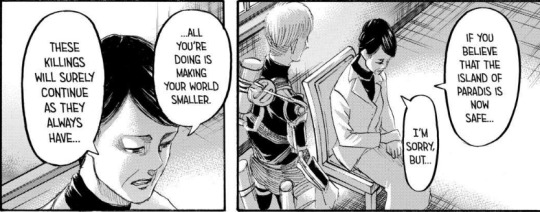
During Uprising, it is routinely discussed that it’s possible the royal family and the upper brass do know something that makes a coup a bad idea. It’s possible that overthrowing them will bring Paradis into an even darker landscape.
What it comes down to is that whatever they know, they’re willing to let everyone else die if it saves their own skin.
Since that particular Everyone Else is united, the coup continues, and the island’s given its chance at actual peace.
Now, the Yeagerists are making that same argument.
Meanwhile, before we were dealing with this, we had Zeke. His argument was that seeing as the world would never change, Ymir’s people were all cursed and damned, it is for the best of all of us if we all die.
He’s the ultimate counter to Eren. Eren is fighting for life, while Zeke is only searching for the best death.
Only by all appearances, Eren’s fight has landed him in the exact same place. It’s only the question of which people are dying.
Getting back to Connie and Samuel, if you squint, Connie is betraying his allegiance to his comrades. ...If you squint. I know he feels that way, and I know what the chapter title is, but the Yeagerists are a genocidal cult who bully their way into power and try to kill off their actual Commander, who Connie is still following.
Samuel might not be aware of that, but that’s what we’ve got.
The closest Connie came to betrayal was throwing a Warrior Candidate into his mom’s mouth, and we wrapped up that subplot.
Without squinting, Samuel is betraying the ideals that Connie chose the Survey Corps for. Connie wants to save people. He doesn’t want all this death, regardless of how it benefits him.
So this whole conflict, throughout this entire chapter, is really all about who wants which people dead.
The Warriors are still fighting for Marley. Despite everything, that’s their home, and their base of operations if they ever want a chance at fixing things. Paradis has more friends on it than they like thinking about, but Paradis is not their problem.
Kiyomi and the Hizuru flock are pretty much... she is just so done, and it’s very easy to see why. This is not their war. They were looking for a beneficial partnership. For power and resources, sure, but they were willing to play ball. Now they get to watch as the nation they helped kills off the world and their only allies are rushing them to a basement. Hopefully to do something significant before their country burns.
What’s left of the Scouts who are actually following the legitimate chain of command is, surprisingly, focused on stopping Eren’s genocide.
Then I guess the rest of the world probably has opinions, but they don’t get any pages. But it’s pretty safe to assume Eren’s high on their ‘want dead’ list. If not all of Paradis.
We’ve got one group of people who are actually, actively, doing the anti-genocide thing.
The rest is just fighting over the biggest piece of the pie.
The conflict is that some people think genocide is bad, and some people think genocide is okay, actually.
And, you know, fine.
Only then we have Eren.
Protagonist boy.
We don’t know his conflict, and he has more power than anyone else in the entire cast. Unless we count the primordial ooze as a cast member. He is a giant stegosaurus monster who has threatened the entire world, and as far as anyone with eyes can see, he’s actually going through with it.
Nothing presented anywhere suggests that there is a way to stop him.
At best, if people succeed in killing him, they will have unleashed a bunch of mindless Colossals into the world. If we revisit our volume 1 knowledge, we know this to be a problem.
Making all of this really, really pointless.
Obviously, this is what all these characters would do in this situation.
Obviously, we have some feelings about them being forced to kill their allies while the world falls apart.
Obviously, the author probably being willing to fast-forward through all of this is not necessarily an indication that that is what creates the optimal story.
Obviously, these are important details.
The plot still might as well be a glacier.
There is one person moving pieces around. Everyone else is just scrambling on the board he’s created and rehashing whether or not genocide is a good thing every time they’re considering shooting someone they kind of don’t want to.
All of the tension is literally an ocean away.
As great as the character moments are, there’s nothing to ground them in. There’s just a baseless hope that somehow, there’s a way out of this, and the story doesn’t end with yet another genocide kicking off a rebellion.
Magath flips on his worst hot take immediately. He does that because his country is dying and it’s reorganizing his priorities and beliefs to line up with what he’s actually feeling instead of parroting the world that created him.
Yelena goes from being catatonic to being a nuisance because -- reasons?
Connie almost kills Falco then doesn’t, because he really, honestly, was never going to kill the kid and we all knew that.
The driving force of all these potential conflicts is just too distant. As much work as everyone’s doing, they’re only making progress towards getting to Eren.
When you have a character who can end the world choosing to end the world, it creates problems. When that character is your protagonist, it’s even worse.
In the past, Eren’s absence has spurred characters to action and revealed more of the world’s secrets. Presently, unlike in his various kidnappings, Eren is the one with the secrets. His absence is making people do stuff, but not stuff that has any tangible meaning outside of putting actions to the belief that genocide is bad.
Secrets, and people seeking answers, has been a major player in moving the plot from the beginning.
Here though, we have the issue of no one having the luxury of investigating why this is happening. Mikasa and Armin might be desperate to know, but they have no tools available to them except the airship. Which, again, just puts them in the same place as Eren. It does not give them much more than they had the last time they were in a room with him.
Whatever secrets are in place, they are insignificant next to the fact that the world is ending as they watch.
Only, you know, slowly.
Because the decision has been made that Eren’s perspective is going to be a Reveal. It has to stay private until the moment it’s relevant to the other members of the cast, or otherwise, what was the point of holding off so long?
The result is this. Too much going on in too little time, and all of it technically mattering, but not enough that spending 40 pages on it really changes how the story is progressing.
I’m not sure this is a problem that would be easy to see coming. In the design phase, I mean. I’ve kind of been cautiously whining about these concerns for several months.
But the stage is set like this: Eren pulls the doomsday trigger. Enough time must pass for Paradis to cultivate a new normal and for Eren to reach land with his squad of titans. The goal is gathering our cast and stopping Eren.
There’s a disconnect between what needs to be done and how much time it takes to portray those things.
Connie’s breakdown over feeding Falco to his mom is a character moment that helps to inform his emotions this chapter. That’s probably why it survived. It still drags four named characters off to a village in the middle of nowhere while Floch’s reign is establishing itself.
Magath’s turnabout this chapter is the culmination of a lot of the emotional connections he’s made with Eldians, and the attachment he has to his home, but it comes after driving in the point of why Marley is so fucking awful. He’s spouting rhetoric last chapter, then he’s immediately confronted with the birthplace of that rhetoric being destroyed thanks to events he’s had a part in forging.
Yelena goes from being willing to let Floch shoot her to having an interest in watching things play out. Courtesy of one background dump.
The emotional beats these characters are all due do not match up with what they have to do, and it’s making things come across as really disjointed. It’s a frustrating combination of this needing more pages, but the idea of yet more pages being spent off where the main plot actually is going on is exhausting.
The world is ending, but the world has been ending for months.
We’ve clearly got a checklist of things to get done before we meet up with Eren, but he’s hoarding the plot. Sticking around to watch the list be physically checked is...
To paraphrase some tumblr post from the past few months, it feels like laundry, mostly.
The story wouldn’t survive just jumping to Eren. The more time we’re away from him, the greater the impact when we finally know what’s up. The more time we have with our squad of unlikely, plucky heroes, the more we’re going to want to punch Eren in the face for not listening to them. Again.
It’s not that there’s no value in devoting chapters to all of this planning and reeling. It’s that no matter what happens here, it is not fixing the larger problem of Eren’s genocide campaign.
The plot is across the ocean, and we are months into watching our cast try to reconnect with it.
For me, that makes it a bit dull to read, but it is hard to hold it against the story. Writing the end of the world when you intend to make the audience care about the world -- even though the protagonist is ending it -- that is a lot of plot. Knitting it all together is not a simple task. You can see the seams popping.
Oh well.
One of the things I will stand by is that this manga is a great story told gracelessly. If you read it all linearly, problems are going to be noticed. Stuff be weird. Plus timed terribly.
But there’s a lot of emotion packed into it all. It’s a story that, when you look back in retrospect, free of any time line and observing only through the lens of your knowledge, it holds up and has power.
So I’m glad all of this stuff is being drawn, because one day, when the story’s over, having a fragmented, disjointed thread of progression isn’t going to matter so much.
Some stories survive on how they’re told.
Arguably, that includes this one, because the anime got people through the first few volumes.
This story, primarily, survives on the quality of what it is attempting to lump together.
...Not that I don’t wish it wouldn’t try a little harder to pace itself, but I suppose all that energy is being spent on Eren. You know. Since he’s the only one who has any of the parts of the plot that matter.
Uh.
As far as what actually happened this chapter, yay for Mikasa showing attachment to Kiyomi and crew. Intrigue for the question of where Eren is being such a topic (he’s a fucking giant stegosaurus last I saw figure it out). Sadness for Samuel being on the wrong side after surviving so long (Connie probably remembers Sasha saving his life). Sadness for Reiner trying to spare his friends the pain of what he went through for his cause. Pat on the head for Annie still being impossibly Annie. Pat on the head for Onyankopon just because (sorry about your life yikes).
The absolute funniest part of all of this, to me, is that Daz is now dead.
Beats freezing to death in a blizzard while two teenagers shout about philosophy over your unconscious body?
Anyway, another month goes by.
Much the way waves do in Wind Waker.
#Shingeki no Kyojin#SnK 128#shingeki no spoilers#SnK spoilers#spoilers#tl;dr#chapter post#it might be worth noting that I spent all of the time writing this post wondering what the hell I was talking about#the nature of how these posts are written means that is now your problem
78 notes
·
View notes
Text
The season 1 finale of Hannibal was so satisfying! I’m so glad they didn’t pull a happy-ending switcheroo, where all of a sudden Will is cleared of all suspicion and the truth comes to light and Hannibal receives his just desserts. This season has been very much formatted as a tragedy, and I enjoy the inevitable conclusion, as heartbreaking as it is. The question it asks: Can you stare into the abyss without falling in?
The season began on a high note, with Will using his high-empathy to solve murders. That fundamental characteristic is both his strength and his weakness. The empathy wasn’t what brought him down though. What brought him down was his choice to self-abnegate. This makes episode 5, where he thinks about quitting, but at the urging of Jack and Hannibal, decides to commit himself to the work, the turning point (Hamartia). After that, his decay was inevitable.
The crisis point was choosing to protect Abigail when he discovered that she killed Nick Boyle. This coincided with Will starting to dissociate and have intense, violent delusions- the tragic force, bringing him faster and faster to the catastrophe. Will’s protection of Abigail is the perfect choice to place at the top of the arc because of the how well they fit together. Abigail’s father’s murders brought Will into her life, and Will’s murder of her father kept him there. Abigail bears ambiguous responsibility for the murders, by being her father’s bait, and Will’s unambiguous commitment to her (replacing the father he robbed her off) forces him to adopt that responsibility too. When he decides not to turn her in for killing Nick, he makes the final choice to commit to her wellbeing above all other moral choices and embrace the violence he has studied for so long.
I would argue that there are two Moments of Final Suspense, or that it’s a moment with two parts separated by the space of a day or so. First, horribly, is when Hannibal kills Abigail. This is setup, where he takes the greatest risk in exposing himself and we hope that this might be the crime he is discovered. By removing her agency (by killing her), we no longer care if she gets caught for the death of Nick Boyle, so one emotional complication is removed. The second Moment is Will’s confrontation with Hannibal in the kitchen, where we see him grasp onto his shattering identity with the repetition of the mantra, “I know who I am.” He has clarity that Hannibal had to have killed Abigail and all the others, and we have hope that he will be able to convince the authorities of this. It comes crashing down when he draws his gun, and we see him fall back to violence, the way he has become accustomed to. Jack, entering the scene, can only draw the inevitable conclusion. It is the gun that proves Will’s guilt.
Unlike a Shakespearean tragedy, which is the framework I’ve been using so far, our protagonist is fundamentally innocent. He is on the side of the angels. It is no great sin to want to protect Abigail, and the grand architect of his misfortune is Hannibal. Lector stands in for the forces of fate, witchery, and curses, but instead of being an unblameable exernal power, he is also a man making choices. He cannot go unpunished, although he seems to have temporarily triumphed.
Anyways, I’m looking forward to season 2
8 notes
·
View notes
Text
My top 10 favourite FMA 03 episodes
Hey, I figured I’d make a list. Everyone likes lists, right?
This was going to be just the list but then I decided to add some thoughts and add pictures so now this is a long post… I’ll be counting down from my tenth favourite.
10. Episode 23: Fullmetal Heart/Heart of Steel (whichever title you prefer)
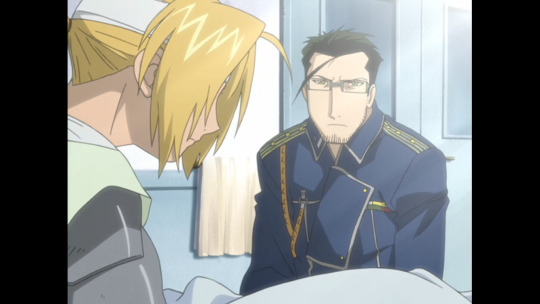
Odd choice, much? This is only a breather episode yet for some reason it’s one of my favourites. Maybe it’s because the characterisation of everyone is just great. You’ve got Edward, Maria Ross, Hughes, Winry and Alphonse all interacting and going through all the aftermath of Lab 5 and it’s just the kind of episode that appeals to me. It’s got some moments of humour as well as the angst. I’ve already made a separate post on this episode actually.
There’s a negative in that Al’s identity crisis is present here and that’s not my favourite arc. That actually gets more focus in the next episode though. I wouldn’t exactly call it an eventful episode either unless you love intense conversations like me. (Hughes is the best, by the way.)
9. Episode 8: The Philosopher’s Stone

Better known for being the Barry the Chopper episode. It also comes immediately after Nina so a lot of it deals with the aftermath of that. Of course, where Fullmetal Heart is a breather, this is the opposite. This is where the evil writers decide to twist the knife that was the Nina incident by putting our beloved 12 year old hero through even more emotional turmoil. As a lover of angst, and exploring fallouts, I loved this episode. (I debated including the Nina episode, Night of the Chimera’s Cry, for this list but chose this one instead.) The encounter with Barry is always very striking, seeing how worked up Ed gets and how unnerved he is. Meanwhile you’ve got Al keeping a clearer head trying to move on while Ed’s not ready to yet. Meanwhile you’ve got other characters around but not able to provide comfort. Mustang, Riza, Winry, even Hughes. Seeing human Barry adds to the lab 5 arc later on too.
Negatives might be that it’s too angsty, I can see it being a turn off. Villain is very blatantly evil. I personally don’t mind that sort of thing though. Also Winry is present but doesn’t do all that much.
8. Episode 17: House of the Waiting Family.

I swear this list isn’t all Breather episodes! But, yeah, this one deals with the fallout from the Scar battle some and does a bunch of other stuff. I’ve already made a separate post about this one too. It’s an episode of recovery, and family. Ed and Al embracing the past they’ve left behind once more. You’ve got Ed visiting his mother’s grave, Winry encouraging Ed and Al to come home again, Ed almost confessing his guilt about the transmutation to Al, Winry finding Ed’s watch and the message inside, Al having trouble remembering the past, Ed and AL reflecting on their home they lost. It’s a good reflective episode. Family is one of the central themes in FMA, and this episode certainly gives that feeling. It’s a pleasant episode with only a little angst and plenty of humour and heart.
7. Episode 31: Sin

I feel like this might be another odd choice? This is the moment where they reveal the origins of the homunculi and how they do it is absolutely enthralling. Izumi explaining how she tried to bring back her unborn child. Wrath letting himself be led to the island. Izumi attempting to strangle him, but unable to do it. Wrath strangling her. Ed and Al’s horror and instinctive denial as Wrath reveals what the story has been building up to. And there’s all the other stuff that’s going on to. Sloth and Envy fighting Greed. Kimblee and Archer meeting and agreeing to work together. Lust and Gluttony in a group of refugees, intending to cause trouble. This episode is so named to focus on the Homunculi and it very much does. The scene between Envy and Wrath is absolutely enthralling. These are the stories that FMA 03 thrives on, in my opinion. It ends with Al of all people furiously attacking Wrath, so it’s hard to resist not going straight to the next episode.
6. Episode 47: Sealing the Homunculus
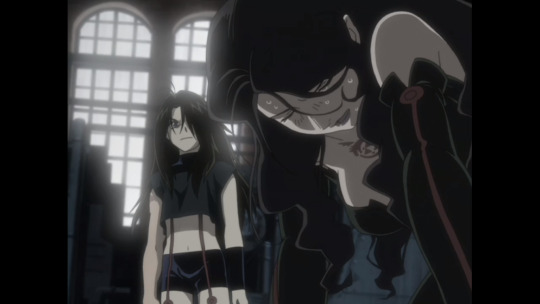
This one is right near the end of the series. I was sorely tempted to go with 48: Goodbye. These two are pretty equal in my mind really. This one is more exciting though. Lust is incredible, her fight with Wrath is one of my favourites, she can switch between being utterly ruthless and vulnerable in an instant. Her end completed her character arc in such a compelling way. She’s one of my favourite characters and you can see so much of it in this single episode. But she’s not alone! It’s also got Sloth and we finally get to understand her motivations and feelings while she also meets her demise. Ed and Al both go through more emotional turmoil even though it’s framed as a triumph for them. Wrath is being Wrath. And it leads so tantalisingly into the next episode.
Negatives might be how Al defending Sloth is a touch frustrating. Also Wrath is being Wrath. Yes that’s a positive and a negative.
5. Episode 13: Fullmetal vs Flame.
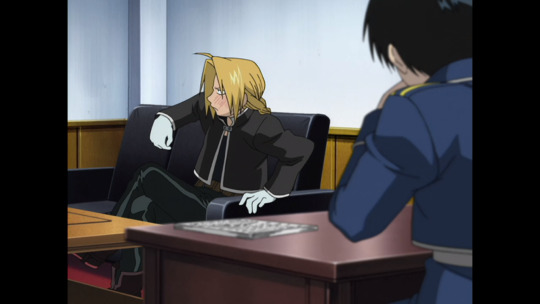
What’s that, a light-hearted humorous episode with only a small amount of angst? This episode is a gem. It pretty much ties up everything that came before and leads very naturally into everything that comes after. I’ve been thinking that if people wanted to watch 03 but have already seen BH, this one wouldn’t be a bad place to start if you don’t want to retread the beginning at a slower pace. (Though you do miss out on some nice episodes). Beyond that, this episode is loads of fun. The fight displays Mustang’s abilities well, shows off the relationship between him and Ed, Hughes is awesome as usual, Al has a cute cat and did I mention the scene where Mustang loves dogs? The little bit of angst mostly comes from Mustang and some trauma he has from Ishval, leading into the Scar battle next episode very well. He’s being built up great. This episode is simply awesome.
4. Episode 3: Mother

Ah, there’s the mix of darkness and family I love. I’m always mentioning this episode and I love how it explores Ed and Al’s past and shows their characters and how they decided to perform the human transmutation. At first it’s heartwarming and then it’s heartwrenching. Ed and Al have always been my favourite characters and seeing their backstory explored in such detail is wonderful. Have I mentioned the part where they walk away from their burning house while Bratja plays with Al narrating? How about Ed coldly standing at the grave swearing to bring their mother back while Alphonse is crying?
3. Episode 51: Laws and Promises
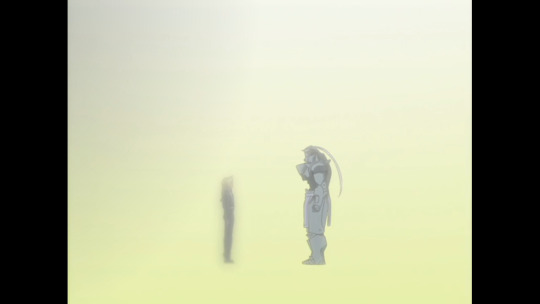
Right to the opposite end of the series. The last episode is so very striking to me. See Ed and Al sacrifice themselves for each other is spectacular. Dante’s plan so quickly unraveling and I’ve talked about how much I love Envy’s final scene before. The epilogue ties off the series fairly well while still leaving things open-ended. Mustang’s fight with Pride is awesome. His scenes with Riza are lovely. Ed’s scenes with his father are interesting. Dante’s demise. Wrath getting to live and getting automail Winry made for Ed. Izumi teaching Al more alchemy. That final speech that closes the series, where the title of this episode comes from. It’s strangely optimistic and hopeful. It’s nice.
2. Episode 28: All is One, One is All.

Another backstory episode. It features Ed and Al’s survival on Yok island with older Ed and Al reflecting on the past. I think this episode builds to its climactic point of Ed and Al coming to understand what Izumi wanted to teach them very well. I’ve made a post about this episode too. (I talk about episodes I like, okay?) The appearances of Wrath leading up to another nice cliffhanger ending are also nice. It’s another episode of reflection and I love it. Young Ed and Al are always great.
And finally:
1. Episode 22: Created Human
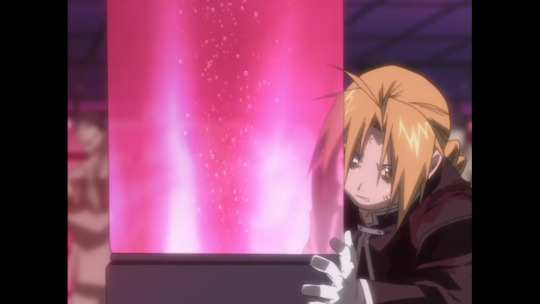
I loved the aftermath of Lab 5. I loved the origins of the homunculi. I love when Ed faces emotional turmoil. And I absolutely love this episode where the Lab 5 arc reaches its dreadful conclusion. Everything about it is great. The moral ambiguity, the homunculi’s goals, Ed getting pushed to the brink, physically and emotionally, just everything that Envy and Lust do, even the older Slicer brother advising Ed. Everything has been building to this moment and it’s executed brilliantly. It makes you start to feel sympathy with the homunculi when they compare themselves to Al’s own inhuman state. It makes you feel Ed’s desperation to save his brother. Al protesting but everyone ignoring him. Envy and Lust talking about equivalence. When they reveal that everyone the brother’s has been working for was leading them here. That moment at the end where the military steps in to save the brothers. Scar doing his own stuff and deciding to help them. There’s even the delightful moment where Mustang breaks the fourth wall at the beginning.
Yeah it’s my favourite.
22 notes
·
View notes
Text
Matt Reviews... Shadowbringers
Tossing a review of the Shadowbringers MSQ below the cut.
I ended up writing a lot more than I ever thought I would.
WARNING: HERE THERE BE SPOILERS.
I’m not exactly honest where to kick things off here, as I have a lot of thoughts.
WoW has been the MMO I solely dabbled in and played for the longest time before hopping into FFXIV in late 2017. I had tried it out before, but hadn’t really committed in the way I wanted to. When I finally got into Stormblood, something clicked there for me. A large part of it was finding the character I wanted to play finally, and another was being engrossed in this story centered areas of the lore that always had me interested.
I found Heavensward and Stormblood to be rather intriguing stories that continued to push the narrative along between expansion and building out the world, and expected more of the same from Shadowbringers.
But I had some worries too. The last time an MMO tried to pull off the “alternate dimension/universe” idea? It didn’t go the way a lot of folks wanted, and much was left on the cutting room floor.
Of course, that was a different game and company but I still had my concerns. My quibbles with previous FFXIV expansions also came into play; the story of Stormblood, which I liked, was uneven due to moving between two different locales and there have been examples over the years of some expansion events dragging a little bit*.
* I’m looking at you, post-A Realm Reborn MSQ content.
Nonetheless, I headed into the expansion with reasonably high expectations. Said expectations were not only met, but shattered. Shadowbringers is legitimately the best story I’ve ever seen implemented in an MMO, and it’s also one of my favorite stories in video games in a long time.
Shadowbringers is a story of sequences, of tension and release that pays off not only threads and plot points introduced early on in the expansion but from previous expansions as well. SE has always focused on long-term storytelling as part of their MSQ, but it’s more evident now than ever with this expansion.
For folks unfamiliar with the premise, your character - the Warrior of Light - is teleported to a world similar to their own but essentially on the precipice of total destruction and tasked with saving it alongside your companions from previous games. In the FFXIV universe, light and darkness are palpable concepts and balance is important. One without the other can lead to total destruction. In the player character’s world, the threat of world-ending calamity comes from the forces of darkness but in this alternate universe the threat comes instead from the Light.
In this world, your counterparts defeated the forces of darkness and disrupted the balance. This led to an apocalypse by way of The Flood, a wave of Light that engulfed the planet and destroyed everything except for a small section that you explore throughout the expansion.
Those who remain are scraping by and praying for a “warrior of darkness” to arrive while attempting to avoid the wrath of the Sin Eaters, the Light’s army of monsters that seek to eliminate and convert the remaining people. For a near century, the sky above is hidden under a layer of Light, a constant oppressive reminder.
The expansion does a fantastic job not only telling a tight and cohesive story that moves throughout the land, but it also succeeds in building out the world and making you give a damn. Sidequests that appear simple have a depth you usually don’t see in MMOs, and I’ve already had conversations with friends about certain side characters that most people would just meme at.
In a way, the MSQ works off a familiar premise that you see in most Final Fantasy games: you’re the big gods damned hero who’s arrived just in the nick of time to push back the big bad and save the world. It’s simple. It’s easy. But what Shadowbringers does differently is the emotional twists and turns throughout.
Long-standing characters like the Scions have new motivations, new things to care about, and new characters are given simple yet effective backstories and personalities that make you care in a matter of moments.
The latter makes me think of the Hrothgar character Runar, who has been living in the forests; even in a cult centered around the idea of darkness and bringing that back, he proves a warm and friendly character who cares about the people around him.
There’s also a Miqo’te couple in the opulent city of Eulmore that could have been the butt of so many bad jokes, but instead they’re woven into the main narrative with thought and care; they’re given a character arc and prove to be one of the more heartwarming stories of the whole expansion.
It’s these smaller interactions woven into the fabric of the narrative at large that make it so good. An attention to detail you don’t see in MMOs often is showcased throughout, and you have the ability to chat with numerous NPCs about events, both past and present.
While Shadowbringers has plenty of hope within its narrative, there’s so much heartache and tragedy too. There’s terrifying moments, pure body horror on display - yes, no joke. There’s a scene in the expansion that made me get out of my chair and have to stop for a moment. In fact, this happens on multiple occasions.
The moment of body horror I refer to surrounds a character named Tesleen, a young woman living in the Ahm Araeng desert. She is a healer who looks after the terminally wounded and dying, those who will become Sin Eaters post-death; she seeks to ease their pain in any way possible, including poison in their last meal that will carry them off to an endless sleep. It’s their way of life, what they do.
She becomes close with Alisaie, but unfortunately… things take a turn for the worse. Tesleen goes into the desert to seek out a child from the encampment and protects him from a Sin Eater, who converts her into one. What occurs is a terrifying scene, body horror on display as she is transformed into one. It is a raw and emotional display, one of many throughout the expansion.
It’s a tough watch, but it’s also how the expansion hits you in the heart. Some characters are lucky enough to escape from some tragic events, but they’re changed for the experience. When you think something might be happening, it often ends up getting worse.
The First is not a kind world. Yes, there are moments of hope but there’s an oppressive feeling throughout the expansion that the next moment could be your character’s last, that any of this could go wrong at any point.
But you have your friends. It’s here again I mention the Scions, your group of companions dating back even to the original release of FFXIV. Some have been on the First for years, and have been tasked by the Crystal Exarch (who we’ll get to later) with trying to help the people, to save them from the Sin Eaters and push back the Light. They have their own character arcs, their own development; some have changed for the worse, and others have changed for the better.
The new Minfilia stands out to mind here. She’s a character who is aware of her heritage, where she comes from, given the tales that have been relayed to her but she isn’t sure how to handle it, what to do with the information. She struggles as she learns about the world around her, but her character development is so fantastic to see.
Near the end of the story, she decides to become her own person and even takes on a new name where I thought she would embrace the role of “new Minfilia” and continue along that same path, which probably would have upset some folks.
Instead, it’s an idea of the twists and turns of the expansion. You think they’re headed one direction, and totally turn the other way. I can legitimately only cover a handful here because there are so many without feeling like being too overbearing.
I think it’s here where I talk about the villains of the expansion, as there’s a full array. Vauthry, the larger-than-life leader of Eulmore, regards himself as a leader free of sin when really he’s perhaps the worst of all. He is callous, cruel, vain, and has aspirations of becoming a god, of controlling the Sin Eaters.
His general Ran’jit is a great foil, an older man who fights with fists and feet. While Vauthry has been corrupted from consuming the flesh of Sin Eaters (yes, this happens), he truly believes in the righteous causes of his leader. There’s more than meets the eye with both characters; they are fascinating studies in how righteous causes can go so horribly wrong.
Then there’s Emet-Selch, an Ascian who has taken on the body of the previous Garlean emperor Solus. He was introduced in the post-Stormblood content, coming across as a wicked madman who appeared to have deeper motives. There wasn’t much to work off of then in terms of who he was.
There’s very good reason.
At some point in Shadowbringers, as you have begun to establish your resistance against the forces of the Light, he decides to accompany your party, to see just what drives you, keeps you going. He helps with reviving Y’shtola, as she decides to sacrifice herself during the story, as a way of gaining your trust.
Then he drops a bomb, a revelation. He does this time after time. In a way, Emet-Selch reminds me of a favorite character in Kreia from KOTOR 2.
They are liars and destroyers, but they also will lay the truth of their world out for you to clearly see, giving their own rational reasons for why they’re doing what they’re doing. Whereas Zenos was a fantastic villain in his own right, as he was an unapologetic villain, Emet-Selch is a different sort.
He’s a tragic villain.
He reveals the Ascians, this group of villains that didn’t really have much inspiration or any context outside of “we want to summon our dark god and take over the universe” before this expansion, as a tragic force. They were once a utopia, a society of thinkers and bureaucrats with unlimited power in the form of creation magicks that ended up destroying their world.
It’s here Shadowbringers really dives into the cosmology of the FFXIV universe in unapologetic fashion. It reveals insane truths about how the First, the Source, and other worlds are connected, how when worlds are “rejoined”, it causes cataclysmic events and thus leads further to the endgame of the Ascians.
They just want to go home and bring their people back, the majority of which were sacrificed in an effort to try and salvage their utopian home. As you get into the endgame of the Shadowbringers MSQ, you learn more about what exactly happened, what led to this, and how Emet-Selch is truly a tragic villain, someone who just wants to go home, wants to bring their people back. You see it in the way he walks, in how he talks; he is burdened by the hundreds of thousands of souls he considered his friends, his family.
They are gone. Only he and a few others remain, steadfast and committed to their cataclysm task of death leading to new life, a new chance.
This is only the surface of his arc and the backstory surrounding the Ascians. SE went ahead and made a group of villains I didn’t find particularly interesting into one of the most fascinating parts of their lore and universe.
It is because of this the ending of the MSQ is so tragic, so devastating, but also it’s a release. The sequence leading up to the final trial (boss) of the expansion is parts inspiring and heartbreaking, as your character - who has taken on the overpowering Light of the world into their body - nearly succumbs and becomes a Sin Eater.
But then you’re saved by another soul, a former Warrior of Light-turned-Warrior of Darkness named Ardbert. If you’ve played through the post-Heavensward MSQ, you know of him as a more antagonistic force-turned-tragic-villain but in Shadowbringers, he is a spirit, your guiding light. The reason why he eventually joins forces with you is an absolutely insane one, but it’s earned by the story at that point because they explain it. They show it.
It’s here where I find it difficult to really explain just what happens in this MSQ at times because I truly believe you have to see it and play through it. So many moments are earned, tragic or heartbreaking, and to explain it by way of a review in text would do it a disservice. You know a game’s story is good when I haven’t even really touched upon the zones you explore or the gameplay.
When the Shadowbringers MSQ finally ended, I just kind of sat there. Just thought upon everything I had seen, had played through, had watched. There’s some post-credits content that gives information on just what is happening back on the player character’s homeworld and it’s… interesting.
In a way I wondered just how they’d play up the threat back home because the threats on the First are so cosmic-spanning that it would be tough to go back to Eorzea and deal with the Garleans, but SE as always looks long-term and sets up some interesting pieces and plot threads that I feel like will be handled in the post-MSQ patches.
While I know some folks aren’t a huge fan of FFXIV’s gameplay, the main differentiation comes down to story and character development. SE gives a damn about keeping a consistent lore and storyline that covers multiple expansions, not at all letting up on the gas pedal especially in Shadowbringers. It is in this expansion that they completely triumph in all aspects: worldbuilding, tension and release, character development, and numerous revelations that fit so well within the lore they’ve established.
At the end of the day, there’s nothing more I can say or do than this:
Go play Shadowbringers.
#shadowbringers#matt plays ffxiv#shadowbringers spoilers#patch 5.0 spoilers#sometimes i write things
8 notes
·
View notes
Text
MDZS Character Tarot Analysis - Part 2
Given my love for the Tarot archetypes, I noticed that the main cast of Mo Dao Zu Shi actually fits these major arcana readings extremely well! I therefore decided to compile all my interpretations of who fits what, including my reasonings.
Part 1 (Arcana 0 to XI) can be found here: https://callanthea.tumblr.com/post/177844446959/
I promised a follow-up post, so this has the remaining Arcana XII to XXI. Again, these are of course my entirely subjective opinions!! I mostly focused on the upright meanings of each arcana, but I gave special preference to character arcs that included both reverse and upright characteristics. There may be some slight spoilers here and there.
————
XII. Hanged Man: Wen Qing
Suspension, restriction, letting go, sacrifice, surrender, meditation on breaking old patterns/habits, buying time, feeling stuck, vulnerabilities, reversal of perspective, new priorities, selflessness, giving up personal needs for greater good, devotion to bigger cause
(Reversed: martyrdom, indecision, delay, getting nothing in return for sacrifice, unwilling to sacrifice)
Reasoning: In what appeared to be their darkest hour, Wen Qing willingly surrendered everything to save Wei Wuxian and the rest of the innocents of her clan. Unfortunately, the Jin clan continued pursuing Wei Wuxian’s group of Wen clan survivors—her sacrifice seemed to be meaningless, her former pride and beauty and ability all reduced to ash for nothing. Still, even now, the best part of the Wen clan survives. As the martyred Hanged Man, Wen Qing’s words and legacy live on: “I’m sorry. And… thank you.”
Runner-ups: as I’m sure you are all aware, our boy Wei Wuxian gave up so much to do the right thing ;__;
XIII. Death: Mo Xuanyu/Wei Wuxian
Endings, beginnings, change, transformation, transition, purification, rebirth, closing one door to open another, putting past behind you, embracing new opportunities, letting go of past, breaking old bad habits.
(Reversed: resistance to change, carrying harmful aspects from past, unable to move on)
Reasoning: Oh boy oh boy. If we had to pick a single major arcana to sum up the entire MDZS novel, it would of course be the arcana of Death. Death isn’t scary—it’s an ending, sure, but it’s also a new beginning. Of course it is a painful process, and it’s all too easy to get trapped in those past memories. But Death is ultimately a chance to put the past behind you, to break old habits, to let go of old and bitter burdens. Closing one door to open another, starting a story anew, just like how Mo Xuanyu’s death enabled Wei Wuxian’s rebirth.
XIV. Temperance: Lan Xichen
Balance, moderation, patience, purpose, meaning, calm, tranquil, taking time, peace, making right choices, adaption, coordination, harmony with others, cooperation, synergy, timing and precision, self-evaluation and new directions
(Reversed: imbalance, stress/tension, excess, conflict/competition, lack of long-term vision)
Reasoning: Ahh, the most chill guy in MDZS~ Lan Xichen very much exemplifies the Temperance Arcana’s focus on patience, calm, peace, and mediation. He brings out the best aspects of those he works with. I specifically chose him for his role in the Three Sworn Brothers dynamic, where Lan Xichen is 100% the balancing and moderating power between Nie Mingjue and Jin Guangyao. At the same time, Lan Xichen wasn’t perfectly successful. Like in Reversed Temperance, Lan Xichen quelled the short-term disputes but could not prevent long-term conflict from finally erupting.
XV. Devil: Jin Guangshan or Wen Chao
Desire, bondage/chains/restriction, addiction, fear, sexuality, materialism, negative lower tendencies, harmful impulses, deception and illusion, feeling despair because of lack of control, obsession, greed, trapped
(Reversed: detachment, breaking free, power reclaimed, detachment)
Reasoning: The two straight-up scumbag characters in MDZS lol. Both Jin Guangshan and Wen Chao act according to their own harmful whims and impulses. And their ultimate fates are also perfectly ironic for the Devil Arcana: Jin Guangshan died from being trapped in the lust he had always indulged in, and Wei Wuxian mutilated Wen Chao into the base animal he always was.
Runner-ups: Jin Guangyao matches the “illusion of lacking control” and the deception aspects. Xue Yang very much works off the low instinct of “revenge”, and he is chained by his own obsessions.
XVI. Tower: Xue Yang
Disaster, upheaval, sudden change, revelation, momentary glimpse of truth, destruction of ignorance and false reasoning, turmoil, misfortune, upsetting all old beliefs, shattering illusions and false foundations, insecurity, shaking your very core, awakening, release from bondage, breaking down your personal defenses, pain and anguish, death of ego
(Reversed: avoiding/delaying the inevitable disaster, clinging to the lie, fear of change, intuition of upcoming calamity)
Reasoning: I’ve literally never met a character who fits the Tower Arcana better than Xue Yang. Come on, even his sword is literally named “Falling Disaster.” The moment he revealed the truth to Xiao Xingchen, I could almost literally see the classic Tower Arcana imagery of “Lightning Destroying the Tower”. That brutal revelation completely shattered the false foundations and illusions of that Yi City daily life. And with that anguished awakening, the fates of every Yi City character were sealed. At the same time, Xue Yang wasn’t solely a harbinger of destruction. Like the Reversed Tower, he too feared the destruction of that ignorance and attempted to conceal Song Lan’s arrival. Even after knowing the peaceful lie was gone, he still clung to its broken pieces.
Runner-up: A-Qing’s intuition enabled her to see the disaster coming, yet she too could not escape the tragedy.
XVII. Star: Lan Sizhui
Hope, spirituality, renewal, inspiration, serenity, intuition, faith and truth in the universe, fulfillment, enduring challenges and now healing, letting go of damaging memories, stable, forgive and forget, new opportunities, personal transformation, believing in yourself, generosity, giving back blessings
(Reversal: lack of faith, despair, discouragement, loss of enthusiasm, test of faith)
Reasoning: Lan Sizhui is very much Wei Wuxian/Lan Wangji/Wen Ning’s ray of hope, healing, and redemption. He went through such hell as a child, but has now been able to let go of that horrible past and make his own brighter future. He is an inspiring and serenely calming force to the rest of the young disciples. His entire existence is basically destiny proving that doing good is ultimately repaid. As the Star, he is the universe’s reward for the selflessness and love of those around him <3
XVIII. Moon: Jiang Cheng
Illusion, fear, anxiety, insecurity, subconscious, intuition, dreams, dim and uncertain, mystery, shadow self, repression, secrets, invisible things being revealed, deception, requirement for vigilance and clear perception, misjudgment
(Reversed: release of fear, weight being lifted, unrealistic, feeling stuck, unhappiness, confusion)
Reasoning: I finally decided on Jiang Cheng because of how much his character arc is rooted in hidden insecurity and misjudgment. Both as a child and as an adult, Jiang Cheng struggles to repress his complicated feelings. He feels stuck in the nostalgic past and trapped in the bitterness of Wei Wuxian’s betrayal. His subconscious fear and anxiety manifests as him literally lashing out. And all these years, he had to sit on a certain unspoken secret. Even by the end of the novel, that weight has not yet been entirely lifted. We can only hope that sometime in the future, Jiang Cheng will finally throw off the remaining shackles of the Moon Arcana for good.
XIX. Sun: “Mianmian” Luo Qingyang
Fun, warmth, success, positivity, vitality, optimism, fulfillment, source of life, happiness, action, radiation of love, confidence, enthusiasm, energy, freedom, enlightenment
(Reversed: temporary depression, lack of success, difficulty finding optimism/enthusiasm, overoptimistic)
Reasoning: This one is probably more of a stretch, but the character arc of Mianmian (AKA Luo Qingyang) is a bright spot in the cultivation world of MDZS. She started out beaten down and taken advantage of by the horrible Wen Chao and Wang Lingjiao, but she grows to take action on her own. She frees herself from the burdens of her original clan to repay Wei Wuxian’s generosity. And she shows up one last time at the end of the novel--now a confident cultivator in her own right and married with an adorable daughter, as proof that happy endings are possible. Her trajectory towards happiness is a great example of the Sun Arcana’s radiating love and infectious fulfillment.
Runner-up: the optimistic baby disciples including Lan Jingyi, who shine the hope for a brighter future in the cultivation world
XX. Judgment: Lan Wangji
Judgment, rebirth, inner calling, absolution, inevitable, new beginning, reflection, epiphany, learning from past experiences, awakening, putting the past behind you, cleaning/purging of sins and wrongdoings, control of own destiny
(Reversed: self-doubt, missing new opportunities, overly self-critical, refusal to examine self, fear of making the important decision)
Reasoning: If our major arcana began with Wei Wuxian, it’s only fitting that it ends with Lan Wangji. In their “first life” together, Lan Wangji struggled to pin down how he felt towards Wei Wuxian, constantly doubting his own actions. He finally reached an epiphany: what he was feeling was love. This was his inner calling, his purpose for existence. Yet he was ultimately incapable of expressing his emotions until it was far too late. Only after Wei Wuxian’s rebirth could Lan Wangji take the lessons he had learned from those mistakes, and finally put his reflections into action. Now Lan Wangji can stand straight and proud, declaring even against the weight of the whole world: This is who I am, this is what I want. As Judgment, he is now the one in control of destiny, able to avoid the tragic fate of their first lives and create a new beginning.
XXI. World: Lan Wangji/Wei Wuxian
Completion, integration, accomplishment, travel, looking infinitely outward, evolution, balance, victory, success, enlightenment, closure, achievement, everything coming together, celebration, fulfillment, unity/wholeness, giving back, new experiences and beginnings
(Reversed: lack of completion, taking the easy path instead of the necessary one, lack of closure, delay)
Reasoning: Come on, do I even have to say it? Wei Wuxian and Lan Wangji complete each other. They are each other’s missing parts. The moment these two lovestruck idiots finally get together is the Mo Dao Zu Shi novel’s peak of achievement, the cheers of success, the point of victory. And of course, you know, the satisfying climax where every single plot thread came together to solve the overarching conspiracy. After obtaining closure on (almost) all the mysteries and starting the celebrations, the two of them can finally elope together, riding off into the sunset to start a new journey across the World <3
And that’s all the major arcana! Thanks for reading, and please let me know what you think about these interpretations too!
257 notes
·
View notes
Photo

Blog Tour – Book Review - Excerpt
Title: Uncuffed
Author: Michelle Dare
Genre: Contemporary Romance
Cover Design: Designs by Dana
Photographer: Darren Birks, Inc.
Models: Darren Birks and Khandace Charest
Hosted by: Lady Amber’s Reviews & PR http://www.ladyambersreviews.com/
Cliff Hanger: No
4 Stars
*This story is for mature audiences only. Contains explicit scenes and language intended for adults 18+
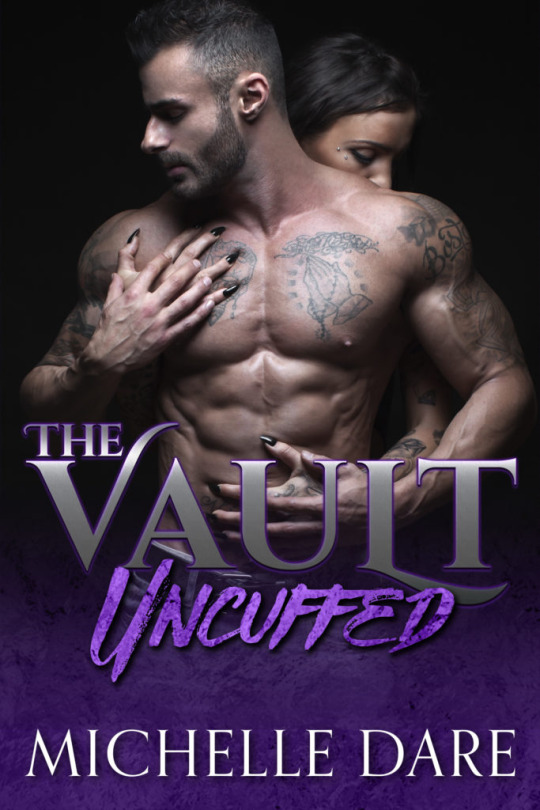
Synopsis:
This book is part of the anthology: The Vault -- A Sinfully Sexy Collection. What started out as a necessity, soon turned into an addiction. Hope craved the high stealing gave her. She put her childhood dreams aside and embraced her life as a thief. Target after target, she took their money before moving on to the next unsuspecting victim. Then she met a man in a bar who flipped her world upside down. The blood in Rowe’s family ran blue. Following in his father’s footsteps, he became a detective, vowing to protect and serve his community. By day, Rowe went after criminals and by night his only pursuit was women. He had no time for dating; his only commitment was to his job. But Hope stole something of his that was worth more than money. The last person a detective should desire was a career criminal. Although, something about her made Rowe need to keep Hope uncuffed. All she wanted was to protect a good man from going down with her when the inevitable happened. Following their hearts led them down a dangerous road, especially since they lived on opposite sides of the law.
My Thoughts:
This was a quick read that packed a lot of punch. Hope is a strong character that had her world turned upside down at 19 when she lost both her parents. She then went through life numb. The only thing that gave her the high she craved so she would feel again was stealing. It all started when she ran out of money and was hungry, she robbed a convenience store. From that day forward, that became her chosen profession and she was good at it.
Rowe was a detective that loved his job. His late father and late brother were both police officers and he honored them by continuing the family profession. You could say he was married to his job. He doesn’t do relationships. All the women he is with know he does not commit and is only there for them both to have a good time. That all changes when he meets this sexy, mysterious, pierced and tattooed woman at a bar. She was blunt, snarky and showed no interest in him at all. He was captivated and wouldn’t stay away. He was persistent and was able to break down her walls enough to go home with her. Hope is always guarding her identity and goes by fictitious names. She has no clue the sexy man pursuing her is a detective until he leaves her his business card. She panics and packs up and leaves her sparse apartment.
That’s where I am going to end it! Like I said in the beginning, there is a lot that goes on and I don’t want to give anything away. I loved the story, the characters and how they developed. I liked the twists and turns and the final outcome when the ride ended.
You want a quick, very sexy read, give this book a try!
ARC kindly provided by Lady Amber’s Reviews & PR for an honest review.

Add to Goodreads: https://www.goodreads.com/book/show/36160380-the-vault
Buy Links:
Amazon US: http://amzn.to/2ENE7NU
Amazon UK: http://amzn.to/2DhlikC
iBooks: http://apple.co/2Dhys0Z
B&N: http://bit.ly/2DiSpo7
Kobo: http://bit.ly/2DhO9FA
Google Play: http://bit.ly/2Dja9jr
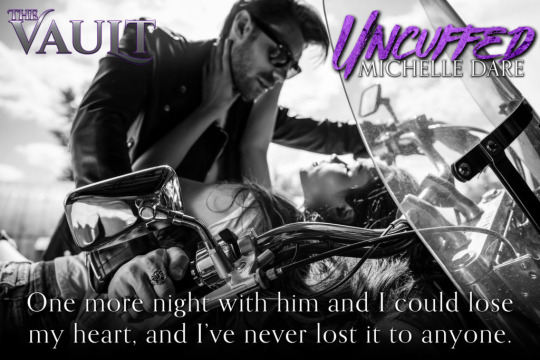
Author Bio:
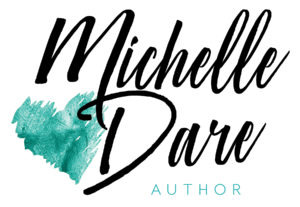
Michelle Dare is a romance author. Her stories range from sweet to sinful and from new adult to fantasy. There aren’t enough hours in the day for her to write all of the story ideas in her head. When not writing or reading, she’s a wife and mom living in eastern Pennsylvania. One day she hopes to be writing from a beach where she will never have to see snow or be cold again.
Author Links:
Facebook: https://www.facebook.com/authormichelledare
Facebook Reader Group: https://www.facebook.com/groups/daresdivas/
BookBub: http://bit.ly/2bgyYn3
Twitter: https://twitter.com/michelle_dare
Pinterest: https://www.pinterest.com/michelle_dare/
Instagram: https://instagram.com/m_dare/
Amazon: http://amzn.to/2sHnFJe
Website: http://michelledare.com/
Newsletter Sign-Up: http://eepurl.com/bt14zX
Excerpt:
Quickly, I bend down and throw her over my shoulder. One of
my arms holds her legs down while my free hand swats her ass.
“You asshole!” she screeches.
“I don’t play. Now you know.”
She’s trying to kick me but not succeeding. Her fists thump
against my back as I take long strides to our table. At the last minute,
I decide to go past our seats to the pool tables. Luckily, one of them is
empty. I drop her ass right on the table. Balls scatter as she flails before
righting herself.
Her eyes blaze with fury. “You’re a dick, you know that?”
“Yup. Now stay here.” I point at her. Then I walk back to the bar
and grab four more shots of whiskey. I don’t want to drink much, but
apparently, she wants to prove a point. Fine. So be it. I won’t let her get
plastered, but she’ll have a hell of a buzz by the time we leave here.
I’m surprised to see she hasn’t left the pool table. Her eyes are on
me as I walk back. I place two shots down on the wooden ledge of the
table and tip one of the remaining two down my throat. She swallows
both shots, one after the other, and slams them down on the green felt.
“Hey, watch the felt,” I tell her.
She rolls her eyes and jumps down. “Up for a game?”
“Depends. Are we betting?” I drink down my other shot.
“Of course we are.”
“What are the stakes?” Oh, I can’t wait to see what she comes up
with.
She walks around the table, collecting the balls, racking them up.
“If I win, you drive me back to my apartment and walk me to my door.
No goodnight kiss, no good night fuck. Especially, no more caveman
bullshit.”
“Fine. And if I win, I take you back to my house and we do
whatever I want. No bullshit. No smart-ass attitude.”
She sticks out her hand, already swaying slightly on her feet. We
shake, then I pull her in close so our chests are touching. “Deal,” she
says breathily.
“Your ass is mine, darlin’.”

#release blitz#book review#excerpt#Uncuffed#The Vault#Michelle Dare#Hosted by Lady Amber Reviews and PR#Blog Tour
1 note
·
View note
Text
My thoughts on... The Last Jedi

Sigh. I really don’t know where to start. Should I open with my background on Star Wars so you know where I’m coming from? How I grew up watching the original trilogy (even though they were before my time) and loved it? How I then embraced its Expanded Universe in the form of the excellent comics (some more than others) from Dark Horse and the neverending string of novels that would often have me question Star Wars continuity? How the prequel trilogy, which was probably my generation of Star Wars movies, left me more than a bit disappointed with the execution of Anakin Skywalker’s story? (it did get better with Revenge though) How it pained me when Disney bought Star Wars from George Lucas and decided to get rid of the Expanded Universe I had invested so much time and money in? (although, if we’re being honest here, the EU had already become a bit of a mess)
In any case, this was my situation when The Force Awakens was released and, to be perfectly frank, I was a bit disappointed with the movie. Given everything I knew about the EU, all of the different characters and stories, I had expected Disney would make better use of the material at hand to tell a new chapter in the Star Wars saga. What we got instead was, essentially, a remake of A New Hope. An entertaining remake to be sure, with likable protagonists in the form of Rey, Finn, and Poe (Kylo, meh), but a remake nonetheless. It made me more than a bit mad to realize that the state of the universe thirty years after Return of the Jedi was about the same as in A New Hope, with a new Rebellion (the Resistance) trying to overthrow a new Empire (the First Order) that had somehow accrued the resources to build massive armies and an even bigger Death Star (Starkiller Base).
It also irked me how Rey, a character who had had no Force training whatsoever that we knew of, was able to so readily use the Force and handle herself in lightsaber combat against Kylo Ren, a character who was shown to be a very strong Force user (if a little unhinged) from the opening shots of the movie, where he not only freezes a blaster shot midair but also does something very similar to Poe, and who had also been trained, to some extent, by Luke himself when he founded the Jedi Academy. Evidently, this did not turn out well for him. There are a few other issues I had with the movie (such as that gratuitous Rathtar chase) but we’re here to talk about The Last Jedi so let me end this bit by saying my expectations for Episode VIII were carefully measured: having made an updated version of A New Hope, presumably to lure audiences in, I expected its sequel to go in a different direction than Episodes V and VI. I didn’t care very much for the destination so long as it took me somewhere. Unfortunately, it didn’t.
It’s a long read so brace yourself.
Needless to say, spoilers follow.
To lead a Rebellion: Holdo vs. Poe

The movie opens up with the Rebels (Resistance fighters is way too long) evacuating their base as the First Order moves in for the kill, something that could be seen as somewhat reminiscent of Empire but, personally, I see it as more similar to the evacuation of Yavin IV after the Rebels blew up the Death Star, something that took place in the EU. There are a few things I can gripe about this opening, such as the use of extremely slow bombers (that are bound to be cut to pieces before they ever reach their target) instead of the faster Y-Wing craft or how the bombs are supposed to fall in a zero-g environment but, in the end, I decided to roll with it. After all, if I already got caught up in those details this early, the film wouldn’t stand a chance. This entire battle is meant to serve one purpose only, to depict Poe as a hotheaded commander who, instead of following Leia’s prudent advice/order to pull back once the evacuation was complete, decided to press the attack against an Imperial dreadnought, ultimately succeeding but losing many lives in the process. Thus is Poe’s arc about learning how to become a better leader (something he should’ve picked up from Leia by now) established. A new character, Vice Admiral Holdo, played by Laura Dern, is then introduced to act as a foil and role model for Poe but, to my mind, it misses the mark by a wide margin.
First of all, I would question the necessity of introducing a new character to play the part at all. After all, Poe has been working with Leia for years now and I don’t think anyone could ask for a better mentor on leadership. Failing that, why not make use of another character this movie had so unceremoniously killed off? I’m talking about the legendary (pun intended) Admiral Ackbar, who led the Rebel attack on the second Death Star. It would’ve been an excellent opportunity to expand on the old admiral’s tribulations since Jedi as well as his views on leadership (personally, I would’ve suggested Mon Mothma but she’s not around for some reason). Or better yet, why not both? Leia and Ackbar might have had different opinions on what makes a great leader that Poe could benefit from. Instead, the movie introduces a new character that shows no leadership skills at all.

Throughout the movie, Holdo seems to want to purposefully piss off Poe, undermining his authority and character (something that is earned to some degree), and sparking a needless conflict between them, through her stubborn lack of communication, that eventually devolves into mutiny. The first thing I can sort of understand. While not an approach I am fond of, sometimes leaders will tear apart someone, defy their preconceptions, deflate their egos, so that that person can get out of his/her own way and mature, with a few pointers here and there from the (wise) leader figure. Unfortunately, this is not the case in The Last Jedi. Holdo is very intent in keeping Poe at arm’s length and out of the loop, what leads into my second point. Despite Poe’s insistence numerous times (he’s practically begging her at one point) Holdo stubbornly refuses to disclose how she plans to get the Rebels out of their predicament. In fact, the movie strongly suggests she has no such plan, and the dismay shows on the Rebels’ faces. The arguments I’ve read in support of her attitude usually come down to these two: the weaker a) Holdo is Poe’s superior officer so she needn’t disclose any plans to him; and the stronger b) Holdo might’ve been suspicious of a traitor in their midst which is why she didn’t tell Poe about it. Both are easily tackled.
As for a), any leader who held this view under these circumstances has no business leading troops in the Resistance. After all, the Resistance is not the First Order, its members won’t blindly follow orders like stormtroopers, to expect otherwise is, quite frankly, stupid. Furthermore, these are the same people who are openly defying the (New) Republic. More importantly however, demoted or not, likable or not, Poe is a hero of the Resistance and, in the eyes of many, a leader figure, someone they trust and will readily rally behind and follow no matter what. The mutiny itself proves this, of course, but the situation shouldn’t have gotten to that point for Holdo to realize this. The fact that she did proves she was not fit to lead the Resistance at this juncture. What she should have done instead was involve Poe in her schemes. After all, and to address b), the odds that Poe would be a traitor are zero (a plot the movie doesn’t even consider). Furthermore, to pull off her plan she would’ve certainly had to involve more people, likely less unimpeachable than Poe, reckless though he might be. Had she involved Poe from the start the mutiny would’ve never taken place, we would’ve been spared 20 minutes of pointless melodrama, and we might even have avoided an even more unnecessary plot altogether: the adventures of Finn and Rose on Canto Bight.
Canto Bight: From the adventures of Finn and Rose

Let’s backtrack a bit. While the Rebels manage to jump into hyperspace and escape the First Order, their reprieve is only temporary, as the Empire (I’ll just call it Empire from now on, it’s shorter) has developed the means to track vessels through hyperspace. The Empire soon catches up to them and so begins the slowest chase in the history of movies. The worst sin this plot commits is that there’s no reason (that I know of) why the Empire couldn’t have accelerated and destroyed the Rebels in an instant. Failing that, why didn’t they send a squadron of TIE fighters or two? We saw the damage Kylo Ren and his two-fighter escort did, surely more fighters would have been more than capable of finishing the job. In any case, a slow chase is now established and it’s evident to everyone that as soon as the Rebels run out of fuel the Empire will slaughter them. However, onboard the Rebel flagship, Finn and newly-introduced engineer Rose, played by Kelly Marie Tran, figure out that the Imperials are tracking them through a device located in Snoke’s flagship. If they can get to it and disable it, the Rebels will have six minutes to escape. Okay, I thought to myself, things are starting to pick up. I should have known better.
In order for the plan to work, Finn and Rose would naturally have to infiltrate Snoke’s ship. However, since it’s shielded they need an expert hacker so they can slice their way in. Okay... so we’re looking for another Rebel who’s a hacker, right? I mean, you could’ve made Rose the hacker and killed two birds with one stone but whatever, who’s joining the party? Oh, some nameless guy on the distant casino planet of Canto Bight (actually, it’s a city; the planet’s name is Cantonica). Finn and Rose will have to travel to the planet through hyperspace, recruit the hacker, return to the Rebel fleet, and enact their plan, thus allowing the Rebels to escape. My jaw could’ve literally dropped when I realized this. Putting aside for a minute the fact that you’re about to kill whatever tension and momentum this slow chase has been building up, you’re telling me that in order for the Rebels to escape the Empire, Finn and Rose will previously have to do that very same thing? Then why not put everybody on transports and have them scatter in multiple directions? Why are we going to waste a good 20 to 30 minutes with this plot that ultimately goes nowhere?
Because it really does go nowhere. The only point this needless detour serves is to get across a few hamfisted messages about slavery and animal cruelty being wrong (no fucking kidding), and the apparently bold (but it’s actually very light) statement that war profiteering also exists in the Star Wars universe, surprising no one. I would have expected such a pointless diversion from George Lucas (actually, even the podrace scene from The Phantom Menace serves a purpose), and indeed this detour has been unfavourably compared with the prequels, rightly so. To make matters worse, not only do Finn and Rose not find the hacker they were supposed to, but even when they do find a substitute (DJ, played by Benicio del Toro) and carry out their mission, the Empire ambushes them (reminds me of Vader getting the drop on Han and Leia in Cloud City) and the mission fails. The only thing Finn and Rose accomplish as they eventually make their escape is to kill Phasma, a character who would’ve been better off dead seeing as she’s resurrected for the space of a few minutes only to get shafted once again. Brilliant storytelling right there. It would not be unfair to say that this movie could’ve cut off Finn and Rose entirely with little to no impact, freeing up more time to dedicate to the more interesting plot of Luke’s (marginal) training of Rey or even Snoke’s non-existent training of Kylo.
The Force: Balance and Mastery

Well, this is a fun topic to discuss. Mighty large too so I wonder how I’ll start.
I don’t quite get how Rian Johnson decided to approach The Force in this movie. The concept of ‘balance’ in The Force was first introduced in the prequels with the prophecy of “the Chosen One” who was destined to bring “balance to The Force.” In the context of the prequels alone, we would be hard pressed to say exactly what that was supposed to mean, considering there’s a vast Jedi Order and the Sith are, supposedly, gone.
There’s a really funny short story in Star Wars Tales (which took several liberties in an Infinities-type universe) where Mace Windu and Yoda discuss this very thing over coffee. Windu suggests the Chosen One will bring light in the same way one pours milk on a coffee. Yoda makes the more shrewd analogy of the Jedi Order being thousands of grains of salt that get blown away to match the sole two grains that represent the Sith. Going by Lucas’ own statement that the prophecy was, in fact, fulfilled when Anakin Skywalker turned against his master, Darth Sidious, in Return of the Jedi and killed him, and considering how he had previously contributed to extinguish the light of the Jedi Order between Revenge of the Sith and A New Hope, one could make the case that maybe both were right.

A panel from the story ‘Force Fiction’ (Star Wars Tales #7)
In any case, the reason I went out of my way to talk about the Chosen One prophecy and balance is because Snoke makes a similar reference in The Last Jedi when he says that Rey has grown stronger in The Force (or some such) to rise up against Kylo and bring “balance.” Luke himself refers to the concept of balance when he talks about the light and the dark sides of The Force when he’s training Rey (one of the few times he actually does). Except that even Anakin, who we’ve now established was “the Chosen One who will bring balance to The Force,” had to train, and struggle, and train some more, and struggle some more. Rey’s reluctant master, Luke, also had to train and struggle throughout the original trilogy. He was arguably not as gifted as Anakin, and certainly older when he started his training, making him a difficult pupil for Master Yoda to train.
Rey? Rey has no such difficulties mastering The Force, even without any training. Luke offers her three classes where they mostly discuss philosophy (more on that later) but she learns how to expertly wield a lightsaber on her own over the space of a couple of minutes and she readily dispatches Snoke’s Praetorian Guard (who I’d assume had been thoroughly drilled in combat for years) after joining forces with Kylo onboard Snoke’s flagship, not to mention she can lift hundreds of rocks with ease (suck it, Skywalker!). Yoda himself pops up in this movie and kind of dismisses Luke’s training of Rey arguing, “she has everything she needs” (by which he could be referring to the Jedi books in her possession, but I would argue that if one could learn through books alone we wouldn’t need any teachers, would we now?).

I still love you, Rey.
But why stop at Rey? Leia herself shows an impressive out-of-nowhere display of Force powers where she either: a) managed to resurrect herself in the vacuum of space, endure said vacuum, halt and reverse her momentum, and return to her flagship; or b) managed to create some sort of Force shield around her before she was expelled into space, halt and reverse her momentum, and return to her flagship; or c) a variation of the above. We all know Leia’s strong in The Force, Empire was the first movie to suggest this, but you can’t go from zero to epic Force god without any training whatsoever. Even if she did have the training, I’d argue you’d have to be nothing short of a Jedi Master to be able to keep your composure and call on The Force so quickly under those circumstances and I think we can all agree that, however cool Leia might be, a Jedi Master she’s not.
So what’s the message I’m supposed to gather from this? Training’s for suckers? Unless you’re good at something from the very beginning don’t waste your breath trying to get better? Females are naturally better at the whole Force business? (curiously, I believe it is suggested in the EU -I think it was in Dark Empire- that Leia’s stronger than Luke in The Force) There’s a reason we empathize with people struggling over something, anything, in their lives, it’s because it rings true, it feels authentic. We’ve all been there and we’ll all be there several times for the rest of our lives. The heroes from all of our favourite stories struggle, they stumble and fall, but they pick themselves back up and eventually overcome the obstacles in their path. This is perhaps the most distinguishable trait in a hero, the strength of their will, their perseverance to not give up when things look bleak and most others would. Heroes are not defined by how many enemies they defeat or how many rocks they lift. And most importantly, heroes aren’t born, they’re made or, rather, they make themselves. The Last Jedi denies Rey the opportunity to stumble and fall, to pick herself back up, and to forge her path as a hero, and it’s a shame.
The Jedi Teachings

“It is time for the Jedi to end.”
Strong words coming from Luke Skywalker, Jedi Knight, and ones that caught my attention (and everyone else’s I’m sure) when I first watched the trailer. I thought that maybe, just maybe, The Last Jedi would make a case against the Jedi, and against the Sith, reminiscent of the one Kreia makes in Knights of the Old Republic II: The Sith Lords. Even without resorting to such a specific example, the notion that there might be some inherent flaw in the Jedi teachings can be found simply by looking at how many from their rank and file have turned to the dark side, and brought a great deal of suffering to the galaxy in so doing. Exar Kun, Ulic Qel-Droma, Revan, Malak, Count Dooku, Anakin Skywalker, Jacen Solo, to mention a few, these were all Jedi who, for one reason or another, turned away from the light. Having experienced this firsthand with Ben Solo (aka Kylo Ren), it would make sense for Luke to ponder this question and indeed he does.
Unfortunately, the case he makes to Rey advocating for the Jedi’s end doesn’t go beyond the example with Anakin Skywalker, incidentally one of the few where the Dark Jedi/Sith is redeemed, a fact Rey is quick to point out. It also sidelines the no less important fact that, just as Ben Solo was manipulated/influenced by Snoke, Anakin Skywalker was similarly manipulated by Palpatine. Thirdly, it also seemingly denies the choices made by the people being manipulated (Anakin and Ben) and ignores the circumstances of their situation, abscribing their fall to the supposed failings of the Jedi teachings alone, failings that Luke conveniently never expounds upon. What made Anakin turned to the dark side? A series of events, to be sure, but what tipped him over the edge was his love for Padmé and his stubborn refusal to let his loved ones die, something over which he’d sacrifice anything and anyone. What made Ben turned to the dark side? To be honest, we’re given very little context beyond “Snoke manipulated him” (The Force Awakens) and “he thought Luke was trying to kill him” (The Last Jedi). How you go from there to teaming up with the same people your parents fought a war against and trying to conquer the entire galaxy (again) I’ve no idea (yes, Jacen did it too; no, I didn’t like it; yes, it was handled better than Ben Solo). And here I thought I’d never see the day where I’d praise Anakin’s story-arc throughout the prequels (but mostly the last two).
What case should Luke have made instead? Or, perhaps rather than instead, as well as. I’ll give you one example and then, just because I can, I’ll tell you why it wouldn’t make much sense. I won’t take the credit for it as it was actually Mon Mothma, as written by Roger MacBride Allen, who said it to Luke, Jedi Master, in Ambush at Corellia. Allow me to quote a brief excerpt from the chapter in question. For reference, it’s Chapter Four: The Dangers of Peace, and I really recommend you read it in its entirety ‘cause Mon Mothma has some harsh truths for Luke.
Mon Mothma smiled. “How much of your life so far has consisted of what you wanted to do? But let’s talk about the Jedi, what I most wanted to talk with you about. What are the Jedi to become?”
“I’m sorry,” Luke said. “I don’t understand what you mean.” It seemed to him that the whole conversation had been little more than riddles of one sort or another. If the Jedi were the most important thing on her agenda, why had she waited until now to bring them up? As for her question, the Jedi were-Jedi. What else would they be?
“All right,” Mon Mothma said. “Let me put it another way. In the years to come, as the Jedi grow from a handful of students into an order of thousands of Knights, will they set themselves up as an elite priesthood or as a band of champions? Are they to be cut off from the people by privilege and mystique, answerable to themselves alone? Or will they act in the service of the people, be intimately bound to the people? Will they be part of the people, the citizenry, or outside them?”
Luke had never considered the question in quite that way before. “It’s obvious what answer you want,” he said, “but I think it’s the answer I would choose no matter what. It seems to me that an order of Jedi that isolated itself from the population would be a very dangerous thing indeed. It would be very easy to forget the ways of ordinary folk if you never experienced the things they did.”
“Precisely,” Mon Mothma said. “I believe, and believe strongly, that the Republic needs Jedi that get their hands dirty, that are part of the Republic’s daily life. Jedi that live in ivory towers might be more dangerous than no Jedi at all. You need look no further than our very recent history to see that it has been the Dark Jedi that have sought isolation. To be a Jedi of the Light, a Jedi must be one with the people. There must be a Jedi on every planet, a Jedi in every city-not a few planets full of Jedi and nothing else. There must be Jedi doing what ordinary folk do, Jedi who are ordinary folk. There must be Jedi doctors and judges and soldiers and pilots-and politicians.”
“And you believe that my path will guide me into politics,” Luke said.
“Yes. If for no other reason than because it is your duty to set an example-and you have always been a slave to duty. If you wander off to brood on a hilltop somewhere, your followers will head off to find their own hills to brood on. If you are out in the world, so, too, will they follow that example.”
Putting aside for a moment the fact that TLJ’s Luke does indeed wander off to brood on a hilltop somewhere, it occurs to me that this was one of the flaws of the Jedi Order during the time of Anakin Skywalker. The Jedi were, in general terms, cut off from society. Normal people regarded them as immensely privileged, not to mention quite powerful (sometimes exaggeratedly so), and resented them for it. The Jedi were thus disconnected from the people they were supposed to serve and protect. In Mon Mothma’s words, when you live in an ivory tower it’s much easier to fall prey to the delusion that you alone know what’s best for everyone, not to mention you can be more easily manipulated. The Luke Skywalker from Ambush at Corellia agrees with her, and why wouldn’t he? Luke wasn’t raised as a Jedi in the old Jedi Order that forced padawans to cut all familial ties and forego emotions, such as love, as temptations that could lead to the dark side.

Another EU reference, this time from Star Wars: Union, where Luke discusses whether Jedi should marry or not.
Luke was given the bare tools he needed to fight a very specific battle that neither Yoda nor Obi-Wan could (or would). It wouldn’t be unfair to say he was shaped to be a weapon that would end the Sith once and for all. However, as depicted during his training in Empire, he refuses to abandon the people he loves and races to save them... only to realize it was all a trap. Even then he refuses to turn to the dark side and attempts to commit suicide, although everything turns out fine in the end.
What I’m getting at is that Luke, the Luke from the original trilogy, would likely not rebuild the Jedi Order as it was in Anakin’s time but instead draw from his own experience and set of values as well, thereby making Mon Mothma’s worry null and void. Ben Solo wouldn’t be cut off from his family as Anakin was, so I doubt Luke’s other trainees would’ve either.
But, like I said, this is just one possible example out of many, a factor that I believe contributed to the overall fall of the Jedi Order. Perhaps Luke was more concerned with his failure as a teacher in The Last Jedi? As I said before, Obi-Wan and Yoda shaped him to be a weapon so maybe he wasn’t wise enough to move past that by the time he set up his Jedi Academy, something that could’ve adversely affected his students.
Unfortunately, it may be something as simple, and yet as complex, as what the film suggests, that light will always bring about darkness and so a ‘balance’ must be maintained. I would counter that that is true of life. Beyond the Jedi and the Sith, the struggle between light and dark, good and evil, is one that takes place inside each and every one of us, if on a different scale. After all, it wasn’t the Sith the ones who developed, built, and fired the Death Star. It wasn’t the Jedi the ones who crossed their arms and allowed the First Order to flourish while the Republic grew weaker. This is such a simple and universal truth that I am having trouble reconciling Luke would’ve spent ten or more years believing otherwise. Neither the Jedi nor the Sith are (entirely) to blame for all of the galaxy’s problems.
As you can see, this is clearly a rich subject that can be discussed at length and explored from many angles, which is why I was so disappointed when the film barely even broached it. Luke’s arguments are fairly weak for someone who’s spent a good chunk of his life pondering the matter. I guess it’s nice that they tried but as Yoda used to say...

Luke Skywalker: Last of the Jedi

We arrive at last to yet another point of contention many fans, myself included, have with this movie, and that is its depiction of Luke Skywalker, Jedi Master. Simply put, I wasn’t thrilled with it but, to be fair, it’s an issue I already had with the previous movie, The Force Awakens, and it stemmed from the fact that it felt like a pointless repetition of the Darth Vader storyline, only this time around Anakin was Ben and Obi-Wan was Luke. Furthermore, it felt out of character that Luke would just give up after failing one of his students and let the galaxy pay for his mistakes. Mark Hamill put it best when he said, “A Jedi never gives up.” I would add to that that Luke Skywalker doesn’t give up either. Equally puzzling is that his friends and family would allow him to do so for so many years but that is another matter.
The Last Jedi further compounds this issue by suggesting that, while training at the Academy, Luke fleetingly considered murdering his nephew when he realized he was slowly turning to the dark side. Bear in mind this is the same person who went on a suicide mission to try and convince his father, Anakin Skywalker, now turned Darth Vader, to come back to the light in Return of the Jedi. Are we supposed to believe he would do less for his nephew? The only son of his sister and best friend? If that’s the case, Kylo did us all a favour when he killed the rest of Luke’s pupils because Luke would’ve probably murdered them himself eventually. No, even if Ben had been turning to the dark side, Luke would’ve done his utmost to convince him otherwise. After all, Yoda said it himself, “Always in motion, the future is.” So, yeah, I disagree with this interpretation of Luke Skywalker and I’m not at all surprised Mark Hamill did as well.
As if that weren’t enough, I wasn’t taken with the way they wrote off his character. That’s correct, I don’t mind (much) that they killed him, that was to be expected, but the way they did it was, frankly, confusing, and I’m being kind. Basically, it comes down to a simple question, if you were going to kill Luke anyway, why bother having him Force project to a planet and appear as though he were fighting Kylo Ren? Indeed, why not have him actually travel to said planet and let him go down fighting, showing us the extent of what a fully trained Jedi, with The Force as his ally, can do? People have been raving about this movie subverting our expectations and, in this case, I was ready to concede the point when Luke pulled a bait-and-switch with The Force... That is until he collapsed and died seemingly of exhaustion a few seconds later. So let me ask yet again a question I find myself repeating over and over, what was the point? Was Rian Johnson worried Luke might steal the spotlight from Rey? ‘cause he does anyway (for a few seconds at least) and, to be perfectly frank, one tends to want to see his heroes go out with a bang, not a whimper. It’s as if this movie doesn’t quite know what it wants to be or where it wants to go and, in fact, it goes backwards.
Back to square one... again

Perhaps one of the most frustrating things about this movie is precisely how it undoes most of the foundation laid by Abrams in The Force Awakens and resets the state of the galaxy to the time of A New Hope (again), if not earlier. Let’s recap:
The Republic is now apparently gone, having been completely erradicated by a single shot from Starkiller Base in the previous movie, something that was painfully stupid then and is compounded even further now.
The Resistance, which was extremely small to begin with, has been reduced to maybe about a dozen rebels in a single ship, the Millennium Falcon. I can’t wait for JJ to explain how twelve people are going to defeat the Empire without a timeskip.
Snoke, who had been set up in The Force Awakens to be a powerful and sinister figure modeled after Darth Sidious, and indeed shows off his impressive Force powers in The Last Jedi, gets killed in the most pathetic and comedic way possible, in a scene that is heavily derivative of Return of the Jedi. I only bring up the latter point because people keep saying Rian Johnson took Star Wars “in new and unprecedented directions” or some such.
The movie toys with the idea of Kylo and Rey being conflicted about their respective roles, but by the end of the movie Kylo’s back to his old self, wanting to kill everyone, and Rey’s back to being the one who’ll defeat him. Neither has grown much insofar character development is concerned. Rey wants to kill Kylo because he’s bad, and Kylo’s bad because the script needs him to be. If you had actually wanted to subvert my expectations here, Kylo and Rey would’ve switched sides or maybe joined forces even. That would’ve been an interesting twist.
As I’ve mentioned before, I’m not a fan of Abrams’ remake of A New Hope, but I would’ve expected Rian Johnson would continue and improve on the story laid down by his predecessor rather than make his own version of the same story with only one more episode to go to round things up. The Last Jedi makes it abundantly clear there was no planned story-arc for Episodes VII to IX. Again, some people have lauded Johnson for ditching some (I’d argue all) of the more important plot threads from The Force Awakens, but I wonder if they would still feel that way if Abrams were to do the same in Episode IX. After all, something like Rey’s parents being no-one (she said it, not me) could be easily explained away as some clever manipulation on Kylo’s part (he does love his mind games). Abrams could borrow from the Dark Empire series and easily resurrect Snoke in a clone body or, better yet, taking over an existing character’s body (also from Dark Empire). He’s almost certain to bring Luke back as a Force ghost to complete Rey’s training (or else Yoda’s last words to him would be pointless, but that’s kind of a running theme in this movie). Would this then be another case of Star Wars subverting our expectations? Or the more believable case of poor storytelling?
Porgs in the wind

Before the verdict, here are a few more random thoughts on the movie I wanted to share:
Finn’s almost sacrifice. Why didn’t we let the guy kill himself again? Honestly, it would’ve been a noble sacrifice in the vein of Holdo’s own and the most productive thing he’d done in the movie. That line about winning by “saving the things we love” and not by “destroying the things we hate” doesn’t fly with me, not in this particular context. The whole point of this suicidal (because it was suicidal) rebel attack was to destroy the Empire’s battering ram cannon in order to buy time for help to arrive. I was frankly stunned Poe decided to change his mind halfway because his people were getting slaughtered, what else did he expect? And when Finn has the chance to actually destroy the cannon Rose crashes into him in order to stop him. What?! Oh, and they make out under full sight of the Imperial walkers that, conveniently, don’t shoot at them.
Another argument I’ve heard is that one of the strengths of The Last Jedi is that it turned The Force into something everyone could have instead of something being tied to your bloodline. Frankly, this argument is so ludicrous I’m forced to believe whoever made it has: a) never watched a Star Wars movie before; and b) yet somehow thought only the Skywalkers could use The Force. Never mind that we knew as far back as 1977 that other people could use it too (hello, Ben Kenobi?). Furthermore, the Jedi clearly existed long before Anakin Skywalker was even born.
Why is Hux still an idiot? I’m starting to feel sorry for the both the character and the actor who plays him. I’m quickly running out of characters to be afraid of in this saga as they are all being turned into a punchline.
I was a bit let down by Yoda’s return, mostly because it doesn’t make a whole lot of sense. Firstly, he seems not to mind that Rey is about to turn herself over to Kylo and Snoke and has even less training than Luke did when he took off for Cloud City to save his friends. Whatever happened to “Only a fully trained Jedi Knight, with The Force as his ally will conquer Vader and his Emperor. If you end your training now - if you choose the quick and easy path as Vader did - you will become an agent of evil.”? Secondly, when he shows up, Luke is about to burn the old Jedi tree, what could be seen as a metaphor for letting the Jedi die. Yet he hesitates, what could be interpreted as him finally realizing that the fight between light and dark will always exist, regardless of there being Jedi or Sith. At the same time, Yoda summons lightning (WTF?) and burns the tree for him, and suddenly this scene now becomes about Luke stubbornly clinging to the old Jedi ways. Wait, what? Where did that come from? That goes against what Luke’s been saying this entire time, that the Jedi need to end, that they need to stop having a monopoly on The Force (what in reality isn’t true, they merely have a monopoly on Jedi training). It’s a nice throwback, master and apprentice reunited, but it feels more than a bit gratuitous.
Nobody came to their rescue? Seriously? The Empire should be less powerful than it was at the time of A New Hope, shouldn’t it? And it’s one Death Star short. Surely those are better odds than those of the Rebellion during the original trilogy. Could’ve been a great way to bring back Lando leading an attack on the Imperial forces. Oh, well.
I guess all of Abrams’ setup about Kylo somehow knowing Rey has now evaporated. Remember that scene in The Force Awakens when he almost strangles an Imperial officer who reports “a girl” was helping Finn escape? That scene strongly suggested Kylo might’ve known a girl who was strong in The Force, before Rey showed up.
I’m a bit pissed off that the movie wasted a perfectly good shot of Luke’s submerged X-Wing on Ahch-To. That could’ve easily led into a scene where Luke, after his conversation with Yoda, raises the X-Wing while Yoda’s song plays in the background, blatantly ripping off Empire (if you’re going to steal, might as well steal from the best), as a symbol of Luke Skywalker, Jedi Master, returning to fight the good fight. I can’t think of a better scene that would’ve screamed, “Yeah, Luke’s coming, bitches!
Please don’t force a Finn/Rose romance. I was perfectly content with Finn/Rey.
Please don’t force a Poe/Rey romance either.
Can’t believe I almost forgot this one! So apparently you can just take out entire fleets by ramming a single ship into them as you jump into hyperspace. Wish the Rebels had known this earlier. A bit odd considering something remarkably similar happens in Rogue One but Vader’s fleet comes out unscathed.
Another one I forgot. How come nobody noticed the planet the Rebels eventually evacuated to? It should’ve certainly come up on sensors when Poe led his mutiny, if not within actual visual range (Poe clearly sees the planet when he wakes up on the transport ship and he wasn’t that far away from the flagship). This leads into...
How did DJ know that the Rebels were escaping to the planet in smaller transports at that precise time? I don’t recall Finn or Rose ever knowing about that particular plan seeing how Holdo kept it from everyone.
Conclusion
By this point, you should’ve already guessed I wasn’t as taken with this movie as critics seemingly were. I hinted as much at the beginning of this review. More importantly, I hope I’ve been able to explain why I think that is. As a movie, The Last Jedi suffers from a lack of coherence and character development, and doesn’t advance the narrative at all. Too many times I thought to myself that this or that was pointless, and that the movie could’ve easily been 30 to 40 minutes shorter and benefited from it. As a Star Wars movie it plays a bit loose with the lore and handles the character of Luke Skywalker rather poorly.
I must admit I feel a bit sorry for Abrams who is now in the unenviable position of either going along with Rian Johnson’s take or retconning some of his more controversial choices. On top of that, he has to provide a satisfying conclusion to this saga, not to mention he’ll have to explain away Leia’s absence. He certainly has his work cut out for him.
How would I rate this movie? At present, I’d rank it lower than The Force Awakens, and that’s saying something given my thoughts on that movie. From a strictly narrative point, I’d rank it even worse than some of the prequels, although it does have better acting overall (which is one of the weaker points of the prequels). If you favour the latter over the former, maybe you’ll like it better.
On the bright side, it can only get better from here, right?

#star wars#the last jedi#star wars the last jedi#star wars expanded universe#luke skywalker#leia organa#tlj#kylo ren#tlj spoilers#ben solo#poe dameron#rey#finn#rose tico#rian johnson#disney#vice admiral holdo#movies#movie review
1 note
·
View note
Text
Sophia’s Wedding: Part 1 (TGG, Season 4, Episode 6)

Today Eli is forced to watch and recap Sophia’s Wedding: Part 1, the beginning of a two-part story in the fourth season of The Golden Girls. When a beloved friend passes away and Sophia is forced to confront a figure from her past, can an old grudge possibly spark a new flame in her life? Keep reading to find out…
Well, this review is quite late, so I apologize! It goes without saying at this point that Jon did a fantastic job of recapping The Almost People, the conclusion of a two-part Doctor Who story arc, and now has some interesting episodes in front of him that will be very focused on the larger story of the Doctor and the Ponds. I’m eager to hear his thoughts, but I really need to get my own recap finished up, so let’s not waste any more time in heading to Miami!
Buttocks tight!
Episode written by Barry Fanaro and Mort Nathan, directed by Terry Hughes
It’s here! The episode opens as Rose gets some exciting news in the mail. She has been granted permission to start an unauthorized chapter of the Elvis Presley fan club. Wait, once you get permission for something, is it still unauthorized? Anyway, Blanche becomes her first member and immediately makes a play for the role of president. Sophia has some less happy news. A childhood friend, Esther Weinstock, has passed away, but Sophia refuses to go to the funeral, as it would mean confronting Esther’s husband, Max. Apparently she has a long-standing grudge against the man for gambling away a shared business with her late husband, Sal. She has sworn a Sicilian oath regarding the matter, but Dorothy offering to pay for the airfare seems to be enough to negate this.
We cut to Brooklyn, where the funeral has wrapped up and Sophia is ready to hit the road. Well, after sampling some food, of course. Max Weinstock talks to Dorothy, and tries to talk to Sophia but gets an earful instead. He finally reveals an old secret, and we get a brief flashback to Brooklyn, 1949, in which we learn that it was in fact Sal who gambled away the business (a pizza and knish stand), and Max took the heat to cover for his friend and save Sal’s marriage. Sal had always wanted to come clean to Sophia, but Max wouldn’t let him. Realizing the truth, Sophia manages to apologize by way of complimenting the food. Max accepts, and the two embrace.
Back in Miami, a meeting of the Elvis fan club is underway, and Rose reveals a recently acquired sacred relic: a pork chop that was partially eaten by the King himself. Dorothy makes light of the holy artifact, and is promptly booted from the organization. She doesn’t seem too upset about this development, but will hopefully find a support group to help her overcome the disappointment. Instead of cleaning up after the meeting, the girls decide to go out to eat, and want to invite Sophia along. However, they make quite the discovery when they go to her room; Sophia is in bed with Max Weinstock, enjoying the “afterglow.” Max came to town the day before, and the two have already decided to get married. Dorothy feels lightheaded, and faints onto the bed of sin.
After she is revived, Dorothy demands an explanation for this development. Max and Sophia state simply that they have fallen in love, and want to get hitched right away. The two share a kiss, and Dorothy says that they are making a huge mistake. She storms out of the room, leaving the others behind.
In the next scene, Rose is in the kitchen sending out wedding invitations, while Blanche mentions that she wants to get an Elvis impersonator for the next club meeting. Dorothy enters the room, but doesn’t want to discuss the wedding. She just can’t give her blessing, as she feels her mother and Max have fallen in love far too quickly. Rose reveals that her Charlie proposed at the age at seven, but Rose held him off because she wanted to see the world, and even studied Latin in college at St. Gustav. Well, Pig Latin. Wait, I didn’t think Rose graduated from high school, but apparently she went to college? Anyway, Sophia also enters the kitchen to show off her dress, but claims that due to custom, she won’t be able to get married without Dorothy’s blessing. Dorothy still refuses, and doesn’t even cave to the threat of a Sicilian curse; she knows a Sicilian loophole that grants her immunity.
The wedding day arrives, and Sophia is locked in a bathroom. She declares that the wedding is off, and delivers a heartfelt speech about her feelings through the door, and it is clear that she is broken-hearted. Dorothy is just about to buckle when a wedding organizer gives her a talking to on behalf of all the waiting guests (more on them in a moment). Dorothy talks to her mother, and tells the truth about the complicated feeling she had about the way this new relationship made her feel about her departed father. But she wants her mother to be happy, and finally gives her blessing. Sophia emerges and hugs her daughter. After one last group hug, it’s time to get started. Places, everyone!
In the living room (because everything takes place here at the house), we discover that the wedding is being attended exclusively by Elvis impersonators. Rose, it seems, mixed the invitations up with fan club correspondence. The priest gets started. Dorothy and Rose mention quietly that they don’t plan to get married again, but Blanche does; we then get a brief reference to Donald Trump which reminds us of what a sad, sad world we currently live in. Ugh. But anyway, Max and Sophia are declared man and wife, the two kiss, and every Elvis launches into a serenade.
The End.
Okay, we’ve recovered a bit from the last episode. I enjoyed this one, and particularly likes seeing some genuinely emotional moments from Bea Arthur and Estelle Getty. I’m curious to see how the writers get out of this one, since it’s obvious that they aren’t going to move Sophia out of the house permanently, or move Max in: will there be a death, an annulment, or some other development? I guess we’ll find out in Part 2! I don’t have much else to say about this one, aside from the fact that it was fairly heartwarming, and I’m looking forward to the next chapter. I give Sophia’s Wedding: Part 1 a score of 3.5 poofy hairdos out of 5.
Join us tomorrow (or later today, since my recap was late) for Jon’s take on A Good Man Goes to War, the next episode of Doctor Who. And I’ll be back on Tuesday with my take on the conclusion of Sophia’s Wedding. Until then, as always, thank you for being a friend, and for being One of Us!
2 notes
·
View notes
Text
A Knight Desperate for Love
Thought I’d write something on this bit of interpretation floating around because VKM revealing that Yuki and Zero didn’t become official till fifty years had passed has squeezed in the idea that Zero is desperate for Yuki’s love, and keeps up hope even when she doesn’t want a romantic relationship with him. It’s already written in stone that Yuki’s distance doesn’t equate to a desire to just be on buddy terms with him---since she won’t let him go---so I want to scrutinize this interesting trait that has been pinned onto Zero’s character.
Let’s dust those early VK volume pages, and remember Zero’s personality in arc one during which Yuki felt all the fluff of her feelings for Kaname while unaware of what was going on at the bedrock of her heart in terms of what Zero meant to her. Sayori noticed Yuki and Zero’s friendship which was a safe arena for the unknown princess to communicate freely things on her mind which Zero could understand, and he lent a listening ear even if the subject was Kaname. It’s very clear that Zero isn’t the type of guy who would desperately seek love from someone who doesn’t appear to have the same sentiments. Tasting the feelings of a sixteen year old girl, along with his wait for death after revenge, was enough to keep Zero from revealing what he had grown to feel. While he was honest to Yuki before she left, Zero went through that year burying/avoiding those feeling yet again by drowning himself in work with the hope of shutting her out of his thoughts. It should be mentioned that before whisking Yuki off into hiding, Kaname had bouts of jealousy and displeasure about an innocent ‘sibling’ relationship even with the belief that Yuki loved him, and would be his.
Arc two reshaped the LT through Yuki’s unquenched thirst (who doesn't love surprises?). Everything hidden within was dug out, then placed on full display for even Aidou to see. One thing lead to another, until Kaname and Yuki’s engagement met an abrupt end as he decided to return to his original plans because things weren’t exactly going as he'd dreamed. Kaname knew that for their relationship to work, Yuki shouldn’t have to be taking responsibility for feelings she had for someone else, living with him for eternity shouldn’t cause suffering and loneliness, talks of punishment had no place in a successful relationship; we know constant desire for blood to the point of possibly resorting to devouring him to put an end to it (no-one enjoys half baked pastries) should be non-existent and most importantly, theirs should be a relationship which gave peace, happiness and brought out the best in both of them. The latter was what he’d wanted to endlessly experience with Yuki, but while there were times of happiness, those moments were too rare.


Yuki and Kaname couldn’t balance each other---his darkness/sins rapidly cut off Yuki’s supply of light---and he was conflicted until deciding that she had given up enough for him. All these reasons and observations caused Kaname, someone who saw Zero as nothing more than a disposable puppet, to face the truth and admit something that he would deem farfetched to even think of in the past or if the LT illusion of arc one remained:

True love shows, and Hino used radiance/light/happiness to help bring across what happens when two people love each other in a world twisted by the darkness of shady vampires. This is after all what attracted Yuki to her parents’ relationship.
Before Kaname said this, Zero had already begun to regret letting Yuki go with Kaname after her return to the Academy when he noticed things weren’t dandy, and after chapters of refusing to own up and act, he decided that running away from all the events which foreshadowed chapter 87 wasn’t the answer. After Kaname became the forge, Zero wanted Yuki to understand that it was alright for her to let everything go, and accept what they both had been trying to kill.


He also wanted Yuki to know that no matter how long it took for her to recover from guilt (there isn't room for false information in the last chapter), he'd be patient. This is a Zero who isn't in the dark about how Yuki feels because he tasted her blood while regaining his memories, and they gave him the go-ahead to embrace what was between them.
If Yuki didn't love him, but the one resting in the ice coffin, Zero wouldn't have said many of the things stated in VKM because that would be telling her how to feel, and Yuki---who isn't mute and knows she can be honest to Zero---wouldn't be smiling along with lies.
She has a daughter to think of.
Carelessly telling a woman who lost the love of her life and the FATHER of her CHILD that no, she's always only desired someone else's blood (i.e. you've never really loved him) wouldn't be accepted if that was the case. If Yuki is that odd type of person who gobbles up lies, then Hino's running a futile race, and is slaughtering her personality because which caring, sane mother does that?
Remember that every child wants to know that at the time they were conceived, mutual love reigned.
Her current actions are affecting her daughter already, and Yuki (who knows how Ai feels) would undoubtedly make things easier if she was honest to Zero, and cut down his hopes. There must be a mighty awesome reason why Yuki evades Ai's direct question in VKM 7 instead of effortlessly confirming love for her father, and keeps holding on to Zero. It couldn't be that she's doing that as fun for fifty years, but we do know why---there were many things she did to deserve, in her eyes, a lonely life and there's guilt because of what was done to Zero for her sake plus what happened to Kaname, but at the same time she does love Zero so it's difficult to just let him give up on wanting a relationship with her.
The good thing is that, as Hino commented at the end of VK, Yuki is able to move on from her burdens and choose happiness.
Desperation isn't in Hino's character outline for Zero Kiryuu.
A Zero in denial would result in him never experiencing the happiness spoken of in chapter 93 and VKM 4. If Yuki remained with someone who wasn't deeply loved for all that time, she wouldn't have been able to look back at her life with Zero and express the happiness shown at the time of her death. There is no room for missing steps in a series like this, and I believe it is unrealistic for an author to play with her readers by using such a huge magnitude of deceit.
VK is a story rooted in finding real love with the person you least expect.
#vampire knight#radiant Zeki#Good night#vampire knight memories#Zero Kiryuu#Yuki Kuran#Yuki Cross#shoujo#thanks for reading#has been edited
48 notes
·
View notes
Photo

Love on the Edge of Time, an all-new stand-alone story about a love too great to be bound by time, from Julie A. Richman is LIVE!

Blurb
He likes whiskey and wild women
She likes Ben & Jerry’s
He’s about to get kicked out of his own band
She ate her way off the Miss America pageant circuit
What could these two possibly have in common?
A psychiatrist
A lot of unresolved issues
A whole bunch of shared lifetimes
And a love that is never-ending
As bad boy rocker, Jesse Winslow, and former pageant queen, Kylie Martin, each fight the demons screwing up their lives, the one person who holds the key to healing their ills and reuniting two souls that have searched for one another, lifetime after lifetime, is the only one who knows the whole truth.
And keeping that truth from them may just be in preeminent psychiatrist Dr. Claire Stoddard’s best interests.
Claire has committed the ultimate sin in the medical world. She’s fallen for the one man she’s forbidden to love.
Her patient, Jesse Winslow.
And she’s not about to lose him to Kylie Martin... Again.
Review

FATE OR DESTINY…. YOU DECIDE!
Let me start by saying, this book is unlike anything you will have read before. The romance revealed literally does span the expanse of time.
I am, weirdly, the type of person who rarely reads book blurb in detail. I pick out the odd words which capture my interest. For this book it was: bad boy rocker and former pageant queen and the whole opposites attract idea. Now, having finished the book, and re-read the blurb, properly, I can see that I clearly missed so much when preparing to start this story.
Having not read anything by the author before, I was delighted to have been accepted to receive an ARC of this book. Drawn initially by the book’s cover, and my pathetic attempt at reading the blurb, I couldn’t wait to dive in. Right from the very beginning, I knew this story was going to be something special. I was quickly drawn to the characters and the unusual way in which they met. Jesse Winslow has a cool, easy going, devilishly attractive personality and image and Kylie Martin is quirky, intriguing and mysterious. When the pair meets, little do they know that they unwittingly set about a chain reaction which will see them face pain, suffering, love, happiness and a whole host of other unforeseen emotions and situations, and this is not for the first time in their lives.
Attending the same psychiatrist, one for drug and drink related problems, Jesse, and the other for an eating disorder, Kylie, they both decide to go down the regression hypnotherapy route to see what, if anything, could be forgotten from their early lives which could be affecting who they are today. For some reason, their psychiatrist, Dr Claire Stoddard, takes them both, independently, down the past life regression road and soon, and totally unexpectedly, she reawakens long-lost life events for both Jesse and Kylie. I was initially fascinated by Kylie’s regression back to 16th century France and the pain and suffering she experienced there, but when Jesse travelled back to ancient Greece, I started to wonder just what I’d let myself in for with this story.
With more sessions comes more revelations for both Kylie and Jesse and whilst, to me, their past lives seemed to clash with my expectations for this story, again, having not read the blurb properly, I struggled to see where the author was taking their tale. Have no fear though, as the story progresses, all of the mystery is revealed, by the bucket load. From what initially started as a hesitant but sweet romance story, this book suddenly morphs into a spellbinding tale of long lost love.
Through the many regression episodes, you can see a pattern appearing which has affected Jessa and Kylie overtime and you can’t help but be fearful of their future. Their love is physically and emotionally on another plane, and you eventually realise just why this is. Their lives suddenly and unexpectedly become intertwined and with a third party ever present in their unusual love triangle, their future looks to be in as much jeopardy as their past. But can Jesse and Kylie find a way to stop history from repeating itself before it is too late?
Whilst having ups and downs reading this story, I did really enjoy it. I seemed to have question after question popping up in my mind throughout the book and these questions were all answered by the end of the story. I loved Jesse and Kylie and their breathtaking bond and even cried a tear or two for them. I would recommend anyone starting this story to read the blurb - yes, I’m hopeless, I know - and to read the story with an open mind and to accept that every page and every word is written for a reason. Embrace the story and the ending will be all the more rewarding.
This ebook was kindly provided by the author prior to release in return for an honest and unbiased review.
We are proud to provide honest and unbiased reviews written from the heart.

Excerpt:
This time he didn’t text. He just called, waking her at two-fifteen a.m.
“Bare-ly dressed again tonight?”
Her laugh, filled with sleep was gruff. “Barely dressed every night.”
“What exactly do you have on?”
“A pink tank top and pink silk bikini.”
“Take them off,” he ordered.
“Excuse me,” there was an element of surprise in Kylie’s voice.
“You heard me. Take them off. Now.” Just hearing rustling on the other end of the line, he could feel his cock stiffen and it felt damn good after all this time. Baby, I’m back, he thought.
“We’re having phone sex? But, Jesse, we haven’t even kissed yet,” her protest was weak. And even she knew it.
“Yes, we’re having phone sex, and when I get back to New York, we’re going to do a lot more than kiss. You’ve friend-zoned me, Toots, and I’m busting out.”
Kylie was smiling on her end of the phone. Friend-zoned Jesse Fucking Winslow? Was he serious? “Nobody puts Jesse in a friend-zone,” she couldn’t help herself.
“Are they off?” He totally ignored her joke.
“Mmm-hmm.”
“What was that?” he asked, his voice gruff and serious.
“Yes, they’re off.”
“Okay, spread your legs, and with your phone, take a picture of your pussy for me.”
“Seriously?” She knew she was blushing in the dark.
“Take the picture, Kylie.”
“Okay, but if you sell this to the paparazzi, I will kill you.” There was a rustling sound, then, “Oh, my God, I can’t believe I’m doing this.”
He laughed.
“Okay, here it comes. I hope it’s photogenic. It would be really embarrassing to have a non-photogenic pussy.”
Pulling the phone from his ear to look, Kylie could hear his moan, exciting her even more.
“So photogenic, Toots, just like the rest of you. And I love the red landing strip. It’s so hot. Oh, man, I love this. Spread your legs wider and use one hand to spread your lips open for me and send me another.”
Following his directions, she did as he requested.

Links
Read Today!
Amazon US: http://amzn.to/2i9w1Wv
Amazon UK: http://amzn.to/2iPJJwV
iBooks: http://apple.co/2xZfMjW
Nook: http://bit.ly/2jgjdRc
Kobo: http://bit.ly/2zyOXoK
Add to GoodReads: http://bit.ly/2h4eQUD
About the Author:

I must've been 5 or 6 when I started writing "stories". I would write them and hide them.
Not wanting anyone to see my "secret" thoughts. I needed to write - even back then. Now I'm just not hiding them anymore. Is that a sign of maturity? Nah...
Writer, photographer, insatiable wanderluster, edge-player, foodie, music addict, pop culture fanatic, animal lover, warrior for the rights of people and planet, and avid cusser (am a Native
New Yorker, so very little offends me...and if I am offended, it must be pretty freaking bad..like
bad grammar!)
I am a big believer in signs and if we keep ourselves open, there are guideposts all along the way. Stay humble. Be true. Be you.
Life is not a dress rehearsal...
Connect with Julie:
Facebook: https://www.facebook.com/AuthorJulieARichman
Instagram: https://www.instagram.com/AuthorJulieARichman/
Twitter: https://twitter.com/JulieARichman
Website: http://juliearichman.com/

0 notes